Romania (2020)
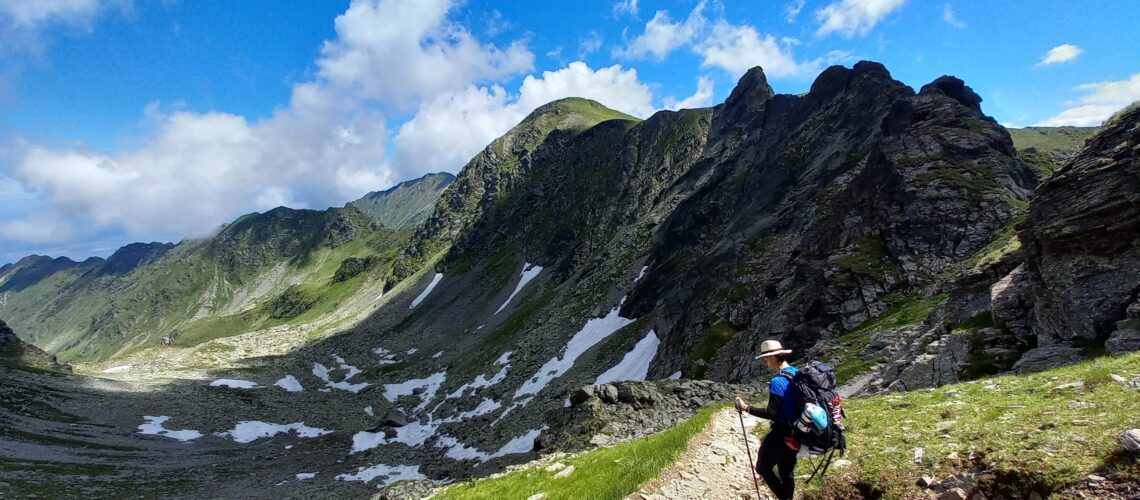
The year 2020 will be probably remembered by most of the world’s population thanks to other topics then travelling. This pleasant activity, which I enjoy so much, suddenly found itself at the bottom of priorities, and for most of the year the emphasis was placed primarily on the health of us, our loved ones and our fellow citizens.
Despite that, the fact that you are reading these lines may give you an idea that even in these difficult times, happiness smiled on us and we were able to saturate our travel appetites. However, it did not go without any problems and fate eventually took us to a completely different place than we originally planned.
As early as the middle of 2019, my brother-in-law Igor and I were planning a larger expedition, and it was at that time that Igor brought me to the idea of traveling with a tent. After a few trips, our South-bohemian hills were too small for us and we dreamed of a two-week expedition to the Georgian mountains. We thought about the trip in detail, bought tickets and the necessary equipment. Despite the outbreak of the pandemic, we looked forward to it for several months and hoped that the circumstances would allow us to make the trip. Unfortunately, our hopes were misplaced. A few days before the scheduled departure, Georgia’s borders were closed to foreign visitors, and although our hearts were broken, our spirit of travel persevered, and within two days we had a backup plan on our table. The new destination was to become the Romanian Fagaras Mountains, part of the Carpathian. The country was open, driving through transit states allowed, and we didn’t want to wait for local governments to change their minds. We quickly packed our bags and drove to face our next adventure.
Můj oscarový film, popisující celou cestu.
Content
Tento blok obsahuje neočekávaný nebo neplatný obsah.
Pokusit se o obnovení bloku
So at eight o’clock in the morning we set out on a long journey through Austria and Hungary. We took turns in driving, which allowed us to maintain a good mood and, most importantly, attention. We were able to enjoy the flat Hungarian scenery and the increasing density of Romanian businessmen, bringing western cars to their homeland on trailers. During the ride, our mood was somewhat ruined by the policy of Hungarian vignettes dealers. Although they were valued at 4,700 Forints (approx. 340 CZK), it was not possible to buy it with Forints. It had to be paid in Euros, which cost € 19 (approx. 480 CZK). I could only admire the splendid business model. Of course, we did not allow ourselves to be annoyed by this and only with slight reluctance supported the local economy.
After arriving in Romania and leaving the highway, we had could notice that Western cars are really popular here. As we passed through villages where time seemed to stop and the brick houses seemed to stand vertically only by the sheer will of their inhabitants, we saw that almost every one of these Neolithic structures had BMW, Audi or Mercedes parked in front of the entrance. Their glosses, in contrast to the poverty of their owners’ homes, proved that the priorities are set a little differently here than at our homeland.
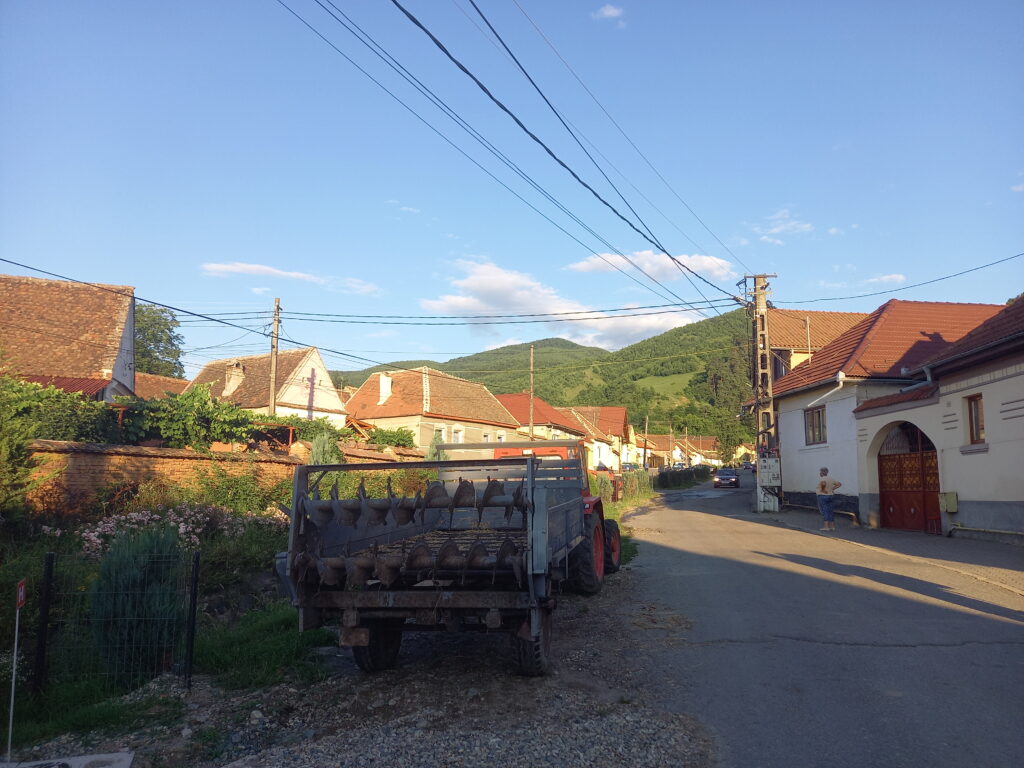
Around half past seven in the evening we finally arrived at our first destination at Sibiu Airport. There we left our car in the hopefully guarded parking lot, put on the mountain boots, visited the last flush toilet for a long time and started looking for a taxi to take us to the village of Turnu Rosu, 40 km away, at the foot of the mountains. The taxi driver willingly took us there for 120 Lei and lectured us on the way on the cultural and social issues of the Gypsy minority in Romania. We listened to his views with interest, but knowing that we will not be able to publish them here.
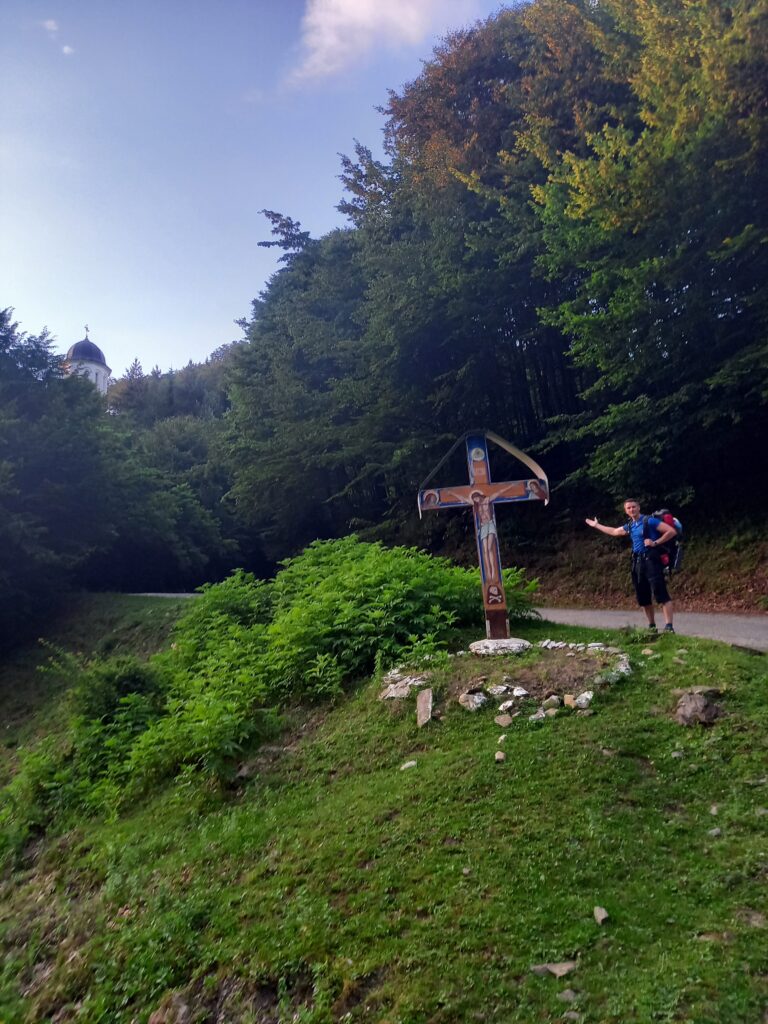
In Turnu Rosu we hoped for an inn and the possibility of the last cultivated food. This hope was quickly dispelled by several settlers, who told us that the pub was closed and they did not have a shop here. So we reconciled and decided to cut some distance from tomorrow’s march and after three kilometers we climbed 350 meters up to the local monastery. We inspected it enthusiastically, exchanged a few words in sign language with the abbot, who allowed us to use the shelter under the monastery for the night. There, in the rustle of around flowing creek, we finished our last Czech beers and lay down on the table for the first sleep in the Romanian wilderness.
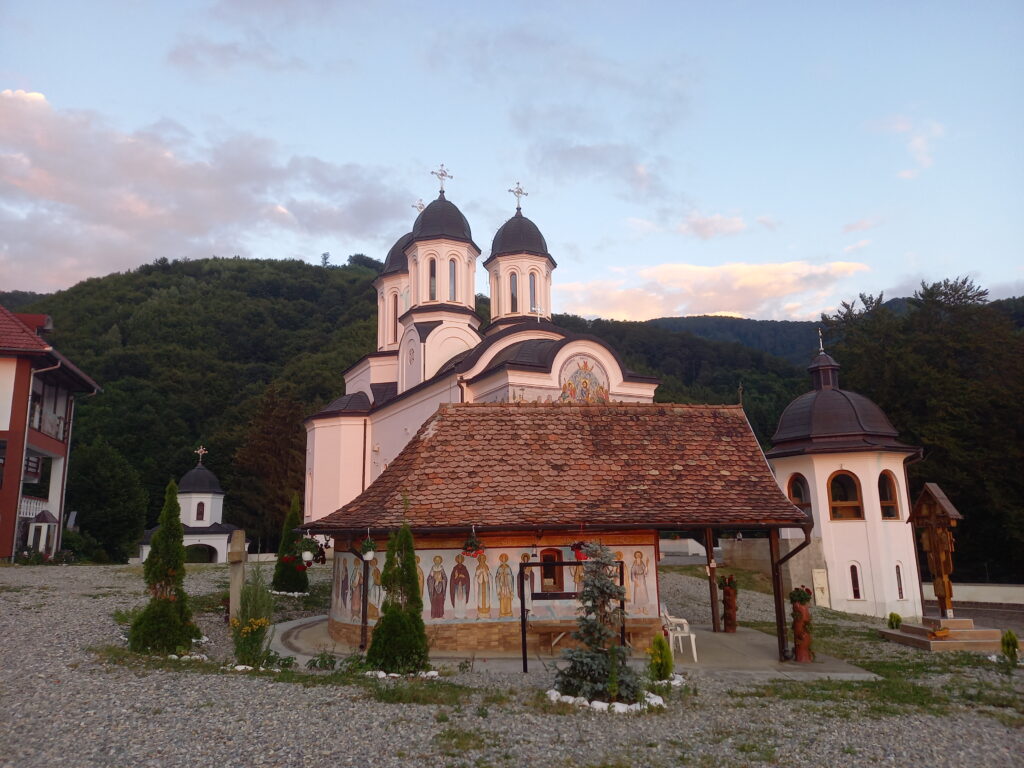
Tento blok obsahuje neočekávaný nebo neplatný obsah.
Pokusit se o obnovení bloku
After a beautiful night’s sleep under the roof, the monastery bells woke us at seven in the morning. Surrounded by religious scenes in the gazebo, we enjoyed a hearty breakfast, drew water from the creek and set out to meet the Romanian mountains. The first 500 meters passed pleasantly, after which the gravel path turned into an almost vertical climb through forrest, which forced us to take a break every ten minutes to replenish fluids and regret what we did. However, bear feces, which were all around us, forced us not to linger and to climb above the tree line as soon as possible. We managed to do that after a few sweaty hours, and at the beginning of the plateau we met the first person. A local herdsman who walked out of nowhere in the company of several donkeys. The animals amused us, but our eyes were fascinated mainly by the incipient view of the Carpathians around us and the plains below.
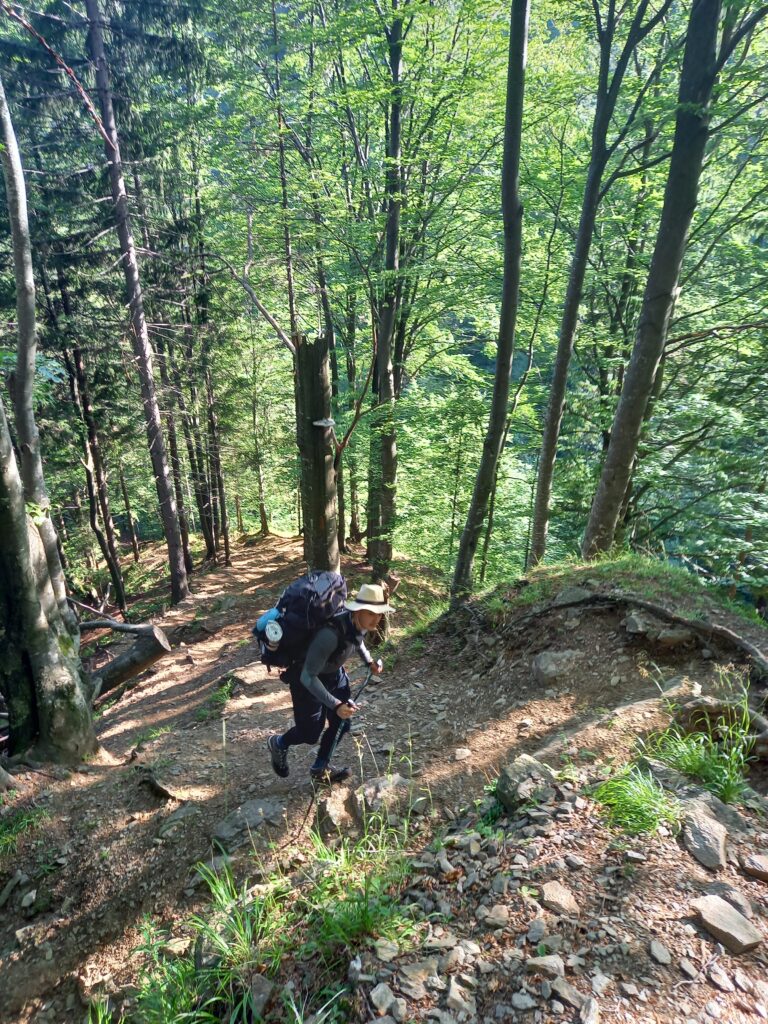
After about two more hours, we finally arrived at the ridge and joined the Trans-Fagaras hiking trail E8, which was to accompany us for the rest of our trip. Wild horses and countless flocks of sheep kept us company. There was always a need to pay attention around them, as they were regularly accompanied by several herding dogs, and the last thing you want to do is get between the dog and his herd. So we always searched carefully for the responsible person in the form of a continuously smoking shepherd, whom we then informed about our position with a few whistles and waited for permission to enter the protected area. The dogs were still frowning at us, but they did not allow themselves to question the authority of their master (and his cane).
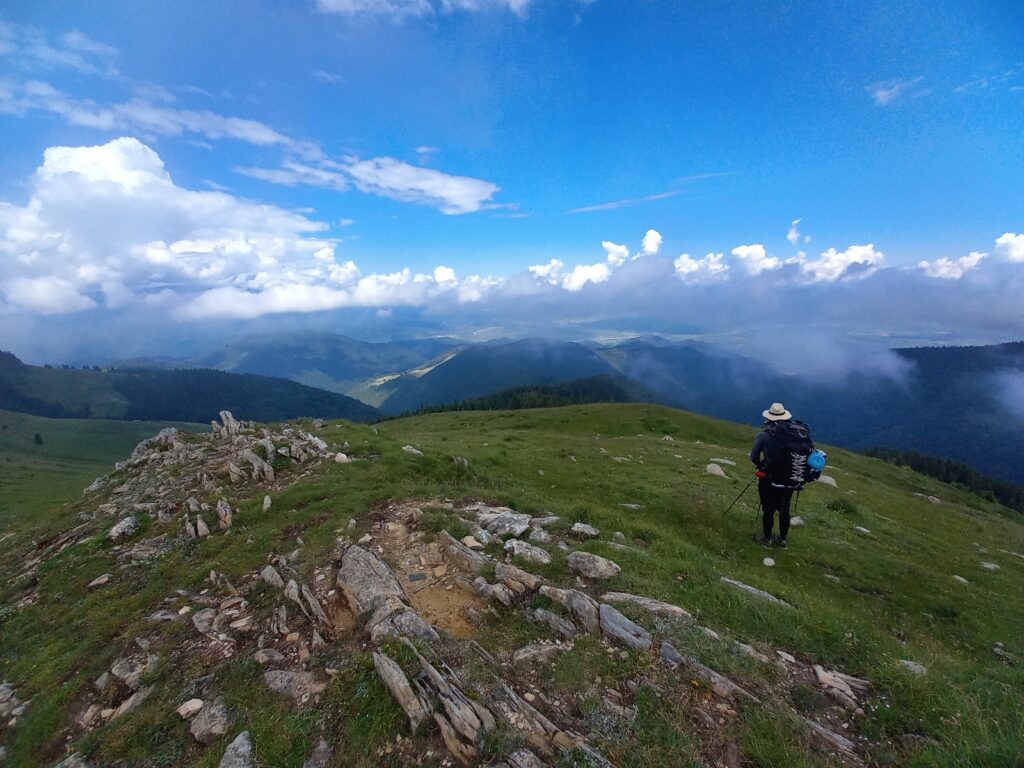
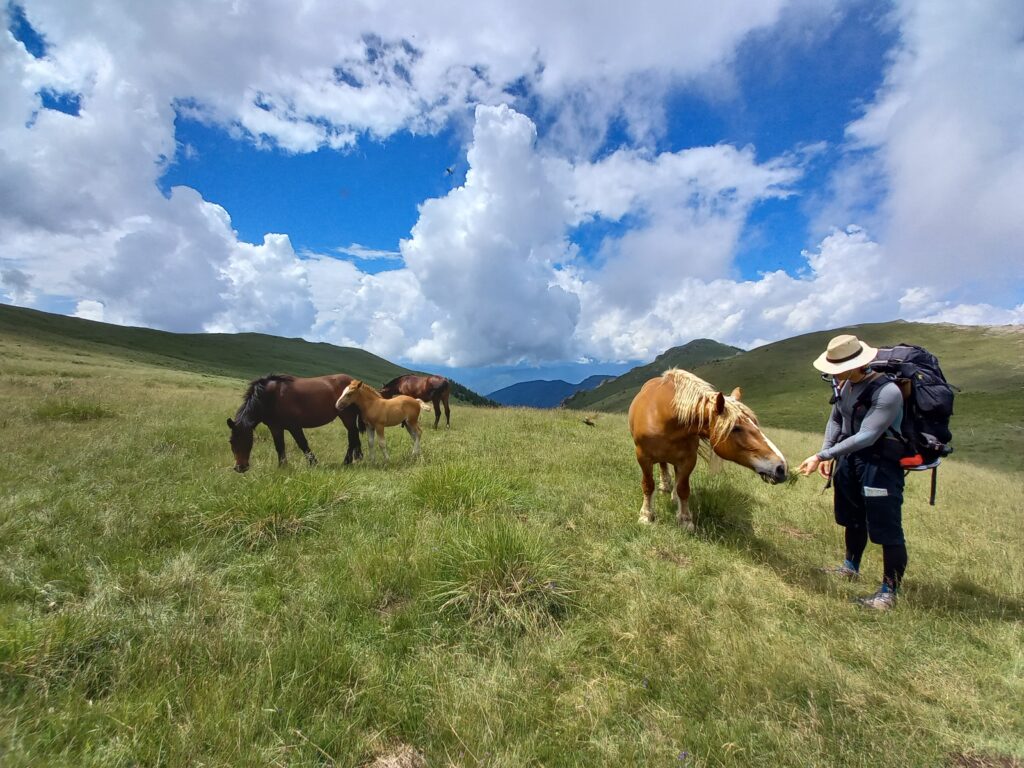
The long and demanding ascent to the ridge cost us most of our water supply. So we identified a potential water source nearby, left the backpacks on the ridge, and descended a few hundred meters along the contour, hoping to replenish our lightweight bags. To our delight, we did come across a mountain stream, springing at a sufficient distance from the poop-producing herds of sheep. However, our professional filters would certainly handle the sheep urine itself (but about that at another time). So we immediately gobbled liters of ionic drink on the spot and each threw another three liters on our backs. My backpack at that point weighted around 27 kilograms and I am grateful that I have thoroughly prepared for this trip with my frequent climbing on our own Kleť mountain.
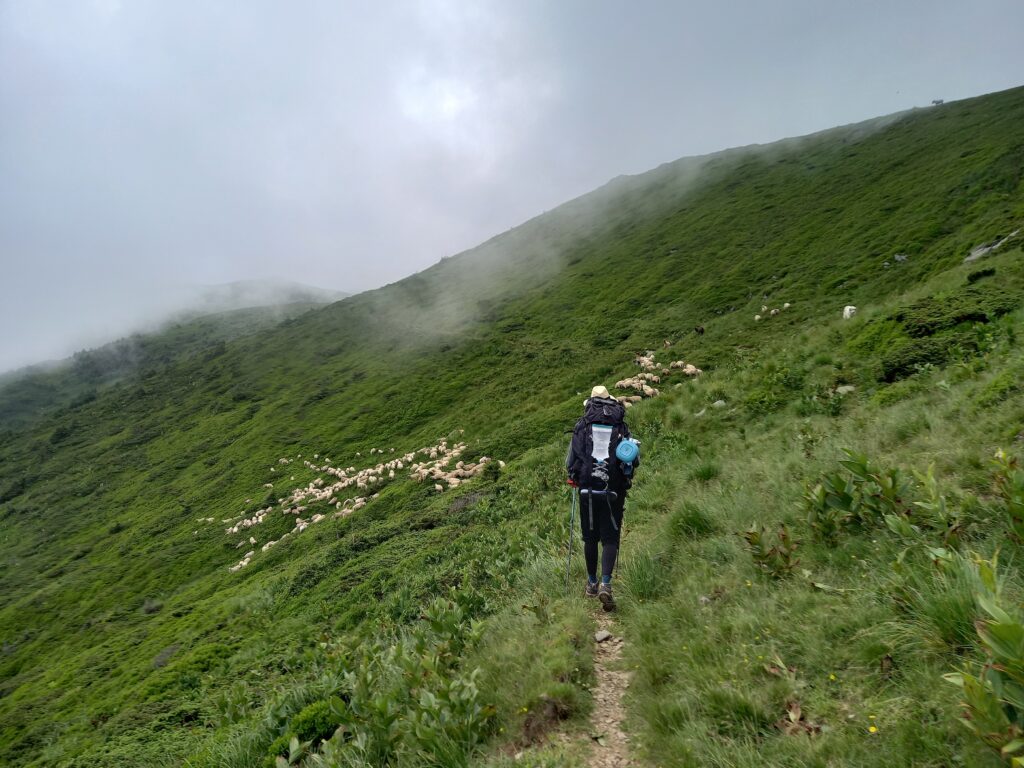

The rest of the day’s journey was placid and undemanding. We marched along the ridge to the saddle of Saua Sarata, where we decided to break the camp. We would still go on, however the place was picturesque, a source of water within reach, and most importantly, we heard thunder in the distance and it started to drizzle. As soon as we pitched the tent, it started to rain. So for an hour we enjoy the scent of our own musk in an enclosed space, sleep, drink rum and play the cards.
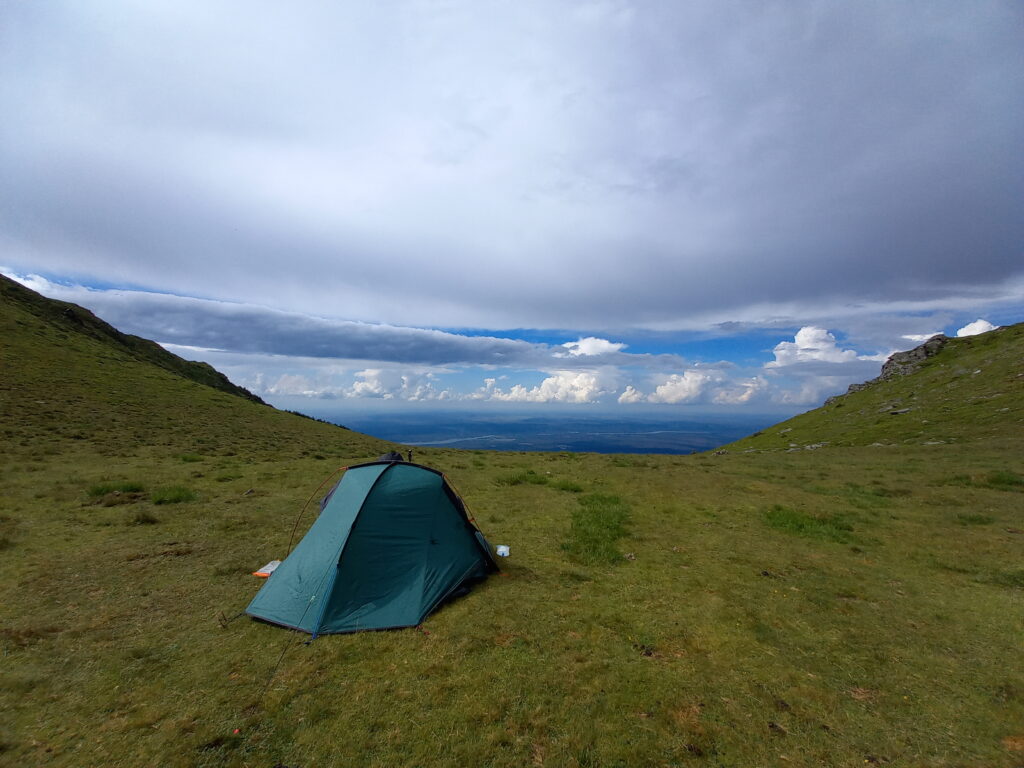
Once the rain subsided, we could climb out and enjoy this beautiful place properly. A pass between two hills with a magnificent view of Romania below us. We underwent basic hygienic procedures in icy water and only in slippers we ran to the surrounding hills to watch the gradual sunset. We were interrupted for a moment by a particularly aggressive sheepdog, which, even from a distance of several hundred meters, probably evaluated us as a threat to his herd. Fortunately, we wereat a height not only intellectually, but also vertically, and at the top of a huge boulder we waited for the shepherd to pacify his dog.

On the way back to the tent, we take advantage of the fact that there is still some flora around us and we collect dry bushes for the fire. We make tea on it in test the flammability of rum and rakia, and hope that the smoke will discourage potential bear visitors. Even so, we hide all the food at a sufficient distance from the tent.
Tento blok obsahuje neočekávaný nebo neplatný obsah.
Pokusit se o obnovení bloku
Despite promising ourselves to get up early, we slept in and woke up at a quarter to nine. The night before, we decided to wait for the full moon and shorten the wait by sampling our rum reserves. Of course, morning awakening was not one of the freshest. However, after finding a way out of the tent, we could congratulate ourselves that we managed to enjoy our campsite on previous evening so thoroughly. In the morning, the visibility was around ten meters and finding a way from the stream back to the tent required a certain orientation talent. Wrapped in clouds, we performed our morning routine, after which we continued climbing the ridge. The limited view slowed down our progress considerably and we moved cautiously, from sign to sign, to the top of Suru. There, in the lee of the boulders, we cuddled together, tried to protect our numb limbs from the strong wind.
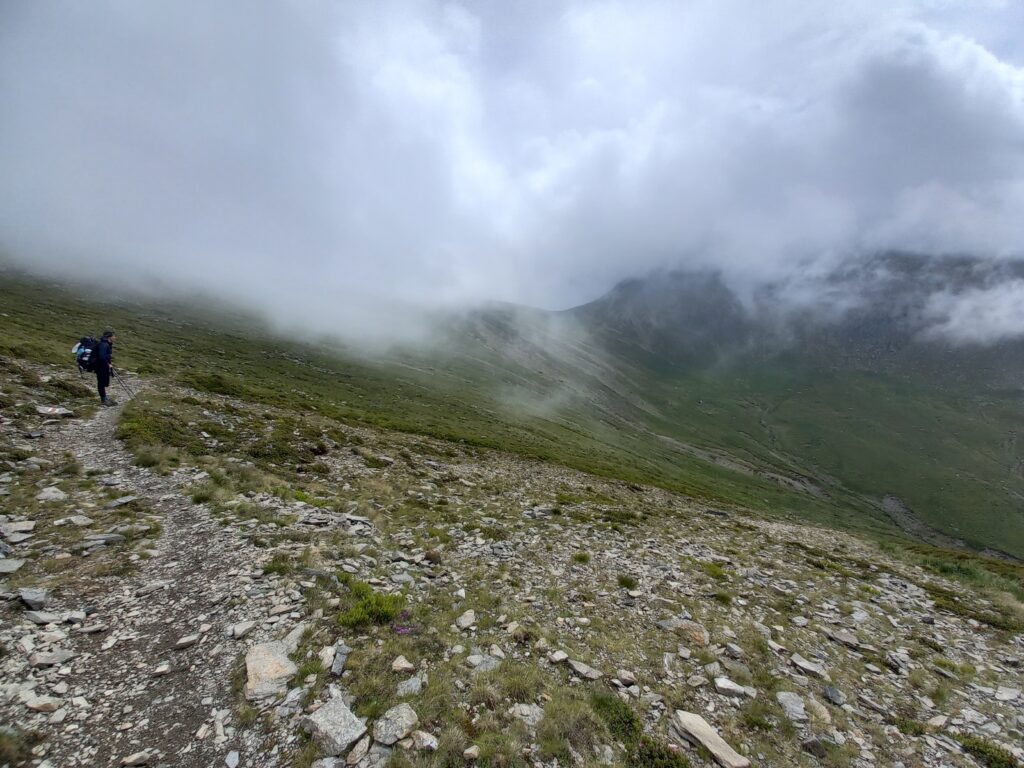
In the valley behind Suru, conditions have improved a bit and with them our mood. We walked around herds of free-ranging sheep and donkeys, admired the scenery, and at lunch we even saw a wolf on the other side of the valley. Igor, with the skepticism typical of his family, called him a dog. However, I promote the attitude that every good story deserves a little embellishment, and I claim that we narrowly escaped being attacked by a pack of these feral beasts.
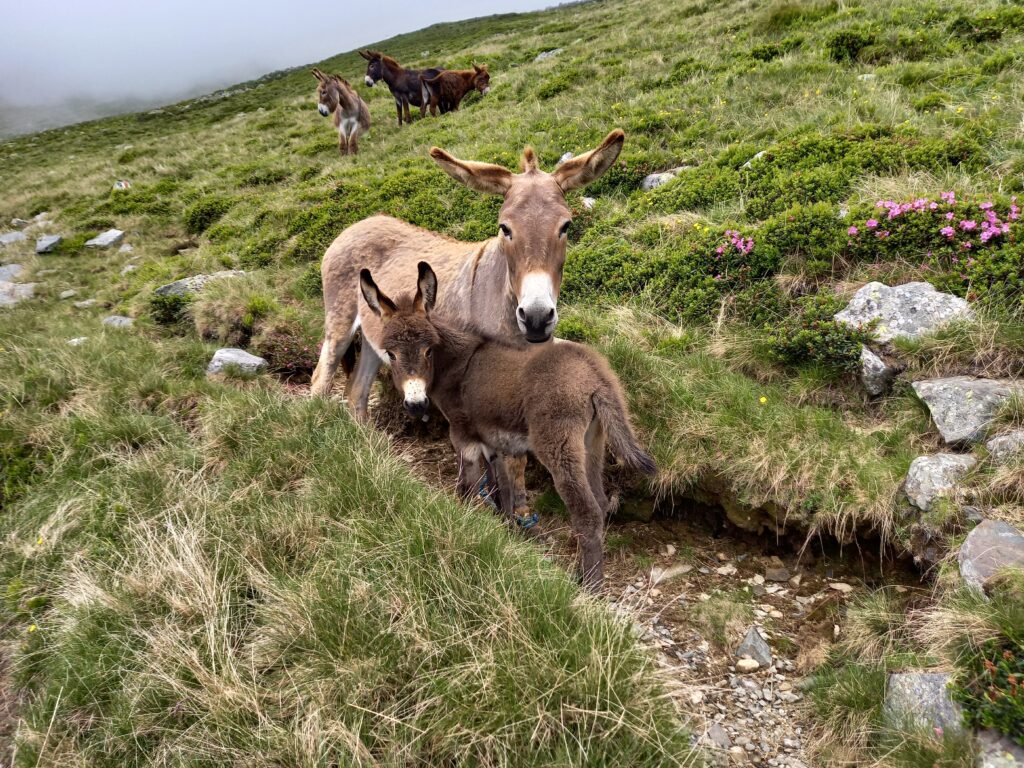
Another peak on our way along the ridge was Budislavu. We were determined to overcome it as quickly as possible, as the converging clouds and thunder in the distance promised upcoming difficult travel conditions and we did not want to find ourselves at the top, exposed to the whims of nature. Despite our efforts, the rain finally caught up with us. Although not heavy, but very persistent. We decided to move on, hoping that the nature will give us a break eventually. But the opposite happened, and on the way down to Lake Avrig it was already raining so hard that small waterfalls formed around us. The stones slipped under our feet and we, soaked to the bone, finally found ourselves by perhaps a picturesque mountain lake, from which we however saw only about ten meters.
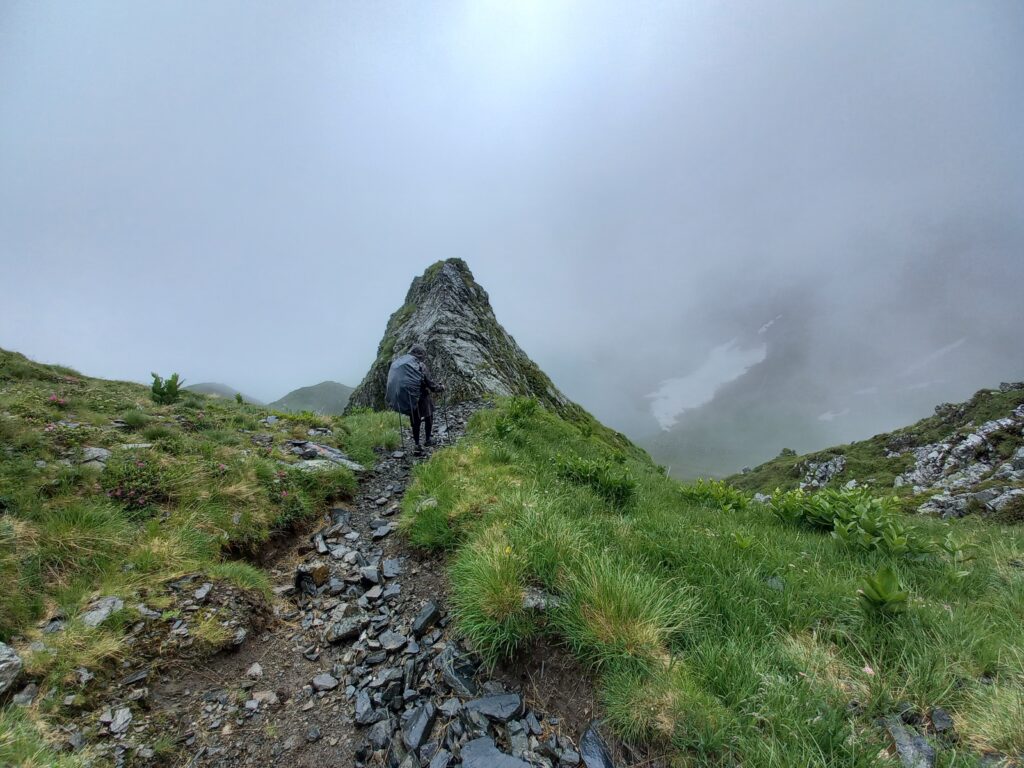
We decided that continuing in these conditions was unthinkable, and at two o’clock in the afternoon began to set up a tent by the lake. Really ambitious task, but, as Igor likes to say, the alternative was to die. Facing such a dilemma, the path to success is usually found. So in the end, we set up our shelter and created an at least partially dry nook in the soaked world around us. We put on everything dry we could find and crawled into sleeping bags, trying to warm up.
Our plan was to outlast the worst of the storm and try to make it to the emergency shelter a few kilometers away, which we, in our desperation, imagined as a hut with a stove and a bed. However, the rain was getting heavier rather than the other way around, and we had to do our best to keep it at least partially dry. This meant from time to time to strip naked and go look around the tent, fix the pegs and plug the holes through which the cold air drew. Inside then back to dry clothes, drink rum and repeat the action in an hour. It didn’t stop raining until around three o’clock in the morning, and our supplies of alcohol, as you can imagine, were considerably reduced by then.
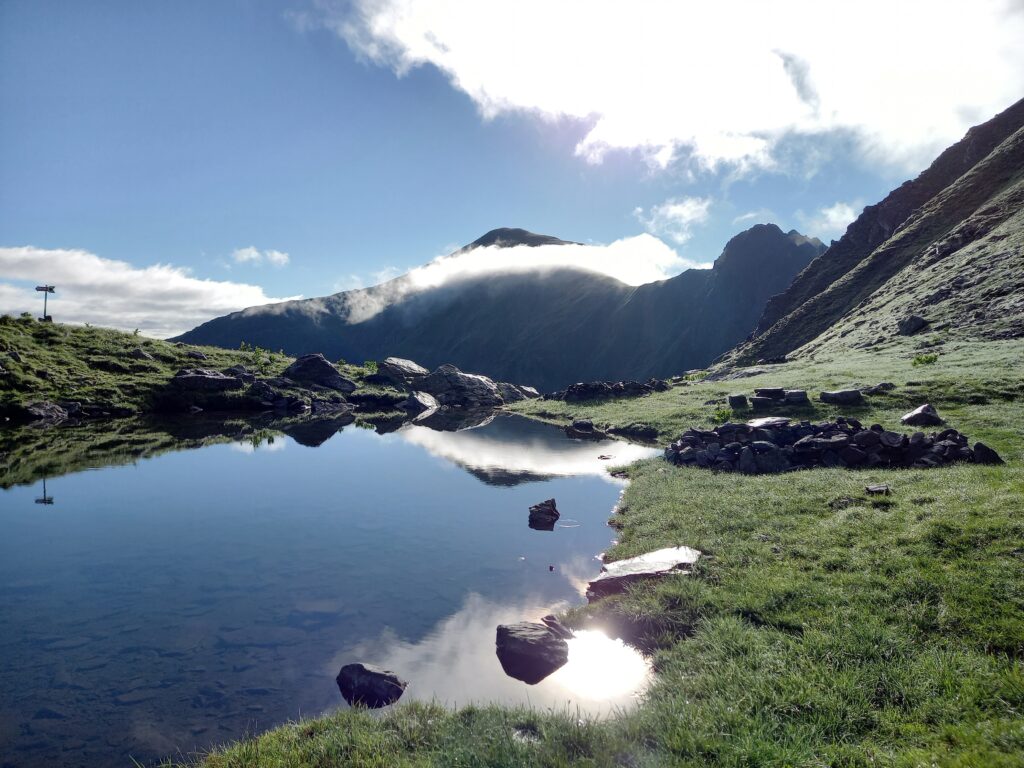
Tento blok obsahuje neočekávaný nebo neplatný obsah.
Pokusit se o obnovení bloku
After a wild, rainy and mostly sleepless night, we woke up to a morning that made up for all the hardships we had. The sun scattered the clouds and we were finally able to see how beautiful a place we chose for the camp. The lake surface was as smooth as a mirror, reflecting a massive cliff covered with snow. We saw a deep green valley below us, into which streams of water flowed, and so, full of enthusiasm, we began to deal with the implications of our terrific night. Soaked equipment was soon spread out on every available stone, and while we waited for our clothes to dry, we were coming up with theories on how is possible that there is so many fish in the deserted mountain lake. Our contemplation was so deep that we only at the last moment noticed that the torso of our tent was picked up by the wind. After a short but determined sprint in slippers, we managed to stop it just a few meters in front of the lake shore.
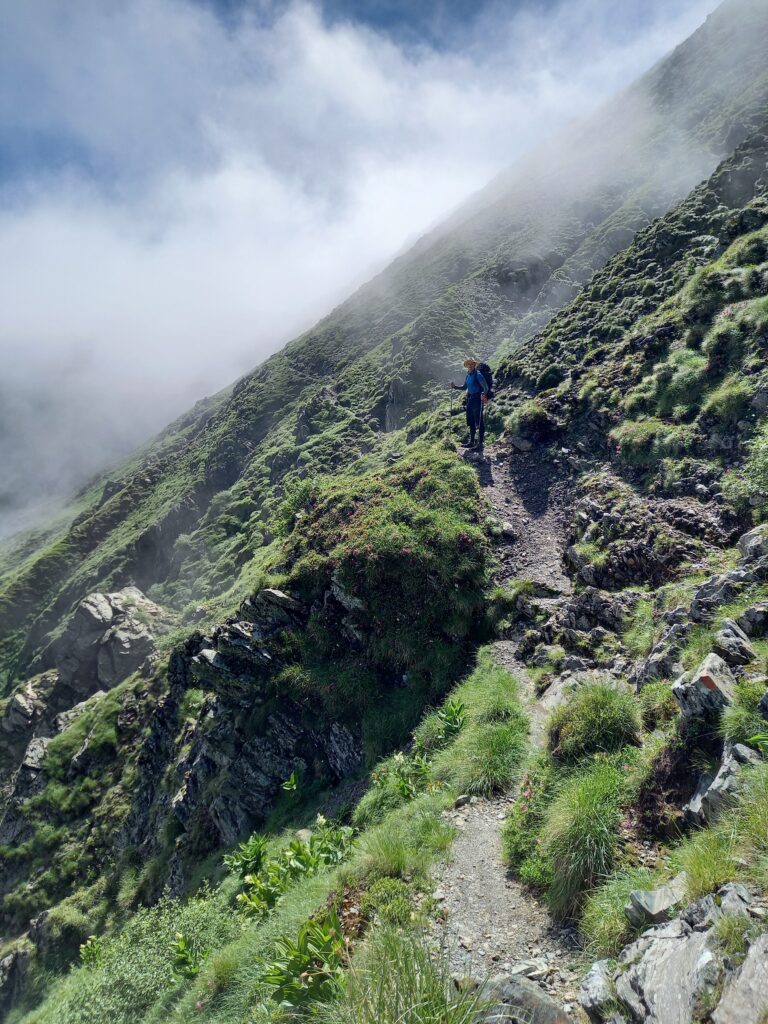
After this warm-up, we decided that our belongings were already dry enough, so we were able to continue traversing the ridge towards the Scara peak. The journey was significantly more difficult than the previous day. The wide plateaus were slowly replaced by sharp rocks and cliffs, on which we often needed to use all four limbs. Balancing with twenty-five kilograms on our backs required a lot of our attention, but we still had enough left to admire the amazing mountain scenery. We had a snack at the top and then descended into the next saddle again in the fog.
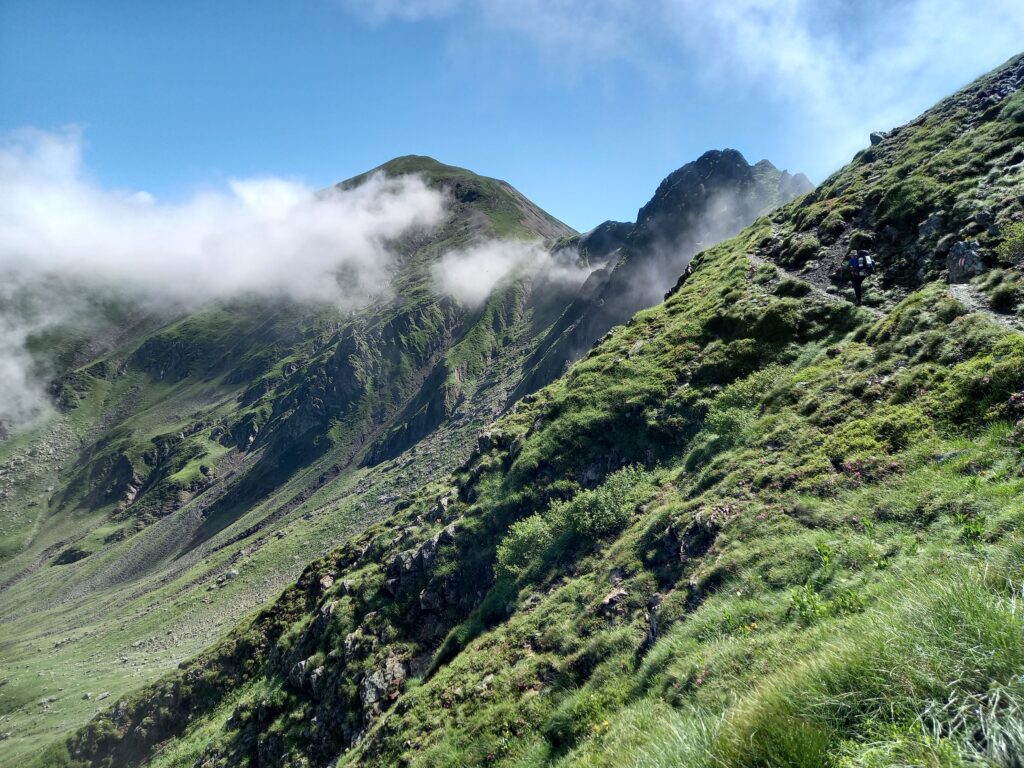
Conditions and visibility were highly variable. The wind leaned to the north side of the ridge, bringing with it clouds that made orientation difficult. The temperature there was around ten degrees. On the south side, sheltered from the wind, the bright sun was leaning against us, the air was barely moving, and we were estimating about 25 degrees. The problem was that the road zigzagged along the ridge in such a way that we were on the other side every ten minutes. Therefore, we had to be equipped for both variants, which in translation means that we were still freezing or sweating.
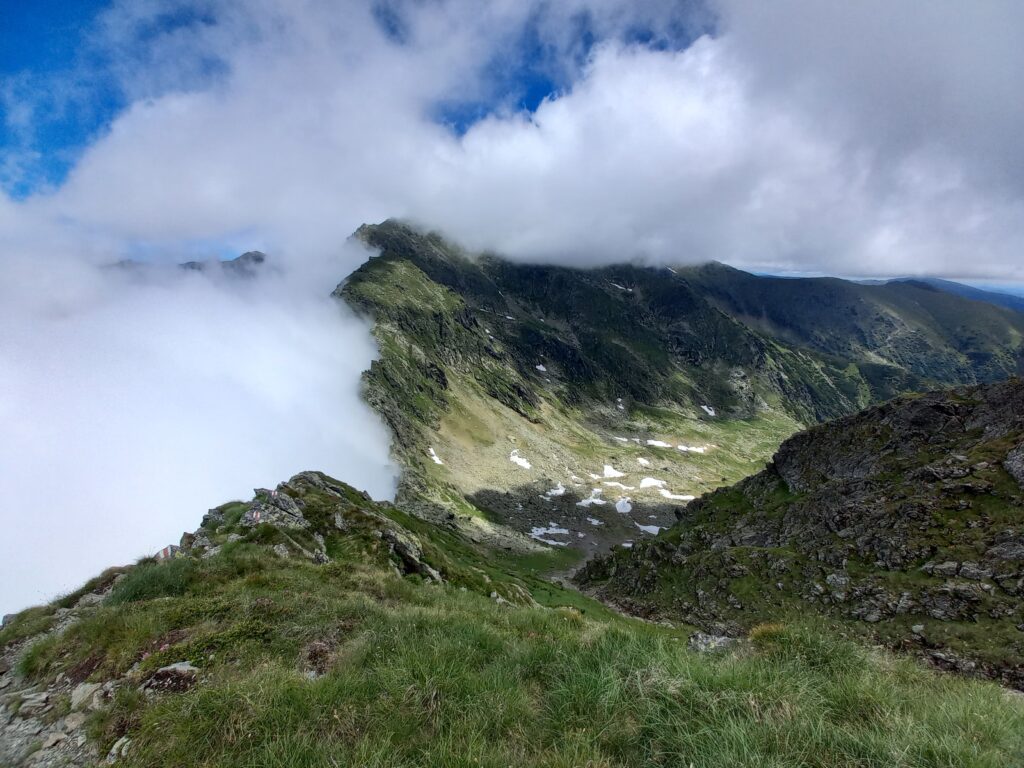
As we climbed to the top of Scǎri, an impressive but frightening look opened before us. Firstly, we had to overcome the challenging climb to Serbota peak, but the real fun was yet to begin. Between Serbota and the second highest mountain in Romania – Negoiu, where we were headed, was the Custura Saratii ridge. This, at first a two-hundred-meter descent and then a four-hundred-meter ascent along slippery and jagged rocks, is considered the most dangerous trail in the country. It was sometimes only thirty centimeters wide, with a gorge of several hundred meters on both sides. Climbing huge stones with a backpack on my back, holding on to slippery chains with the image that one wrong step or slipping means repatriation I will remember for a long time.
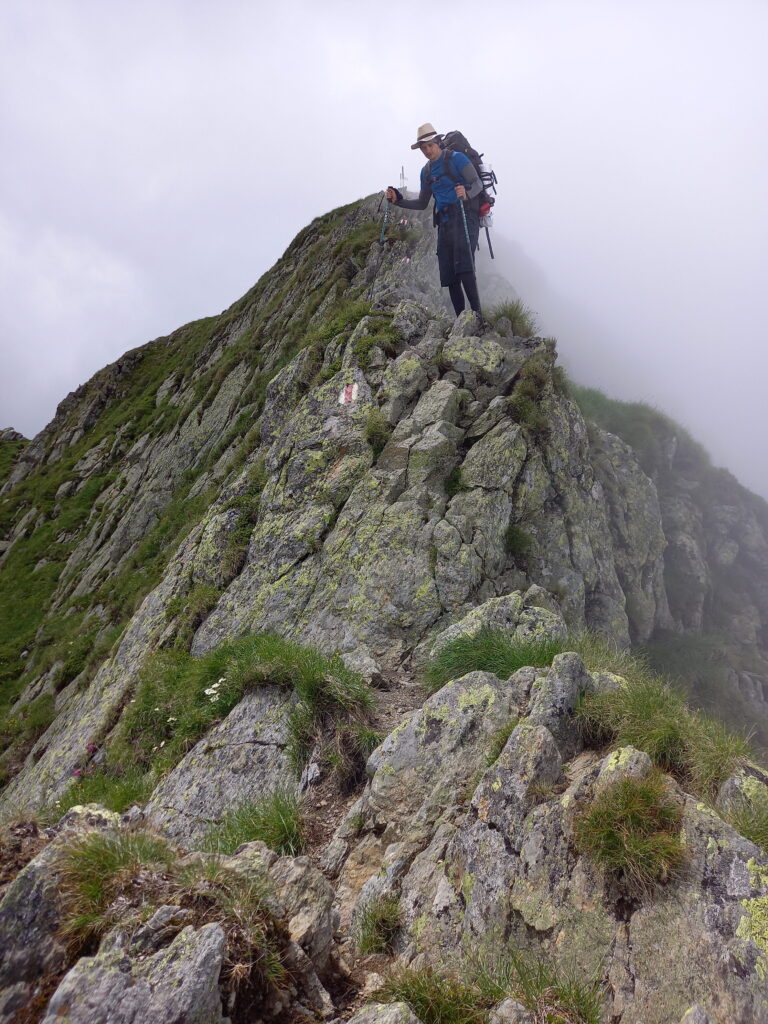
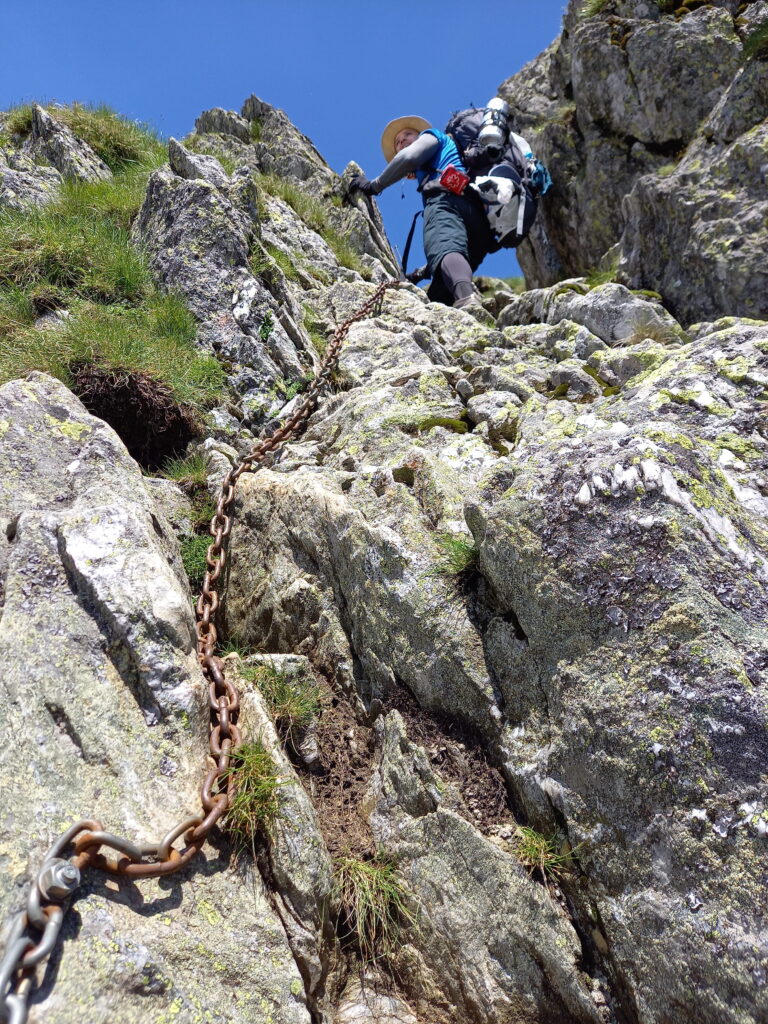
Fortunately, everything turned out well. We were either enough physically equipped , careful, or we were just lucky. After getting out of the worst, I mentally apologized to my wife for taking such a risk, gritted my teeth, and continued with her brother to the top. It compensated us again for all the suffering. Not only were we all alone on it. After all, we haven’t met a single tourist in the past three days, just a few herders. The weather was also fantastic and the whole southern horizon was without a single cloud. We celebrated the success of overcoming this 2535 m mountain and the availability of the signal even allowed us to call our families.
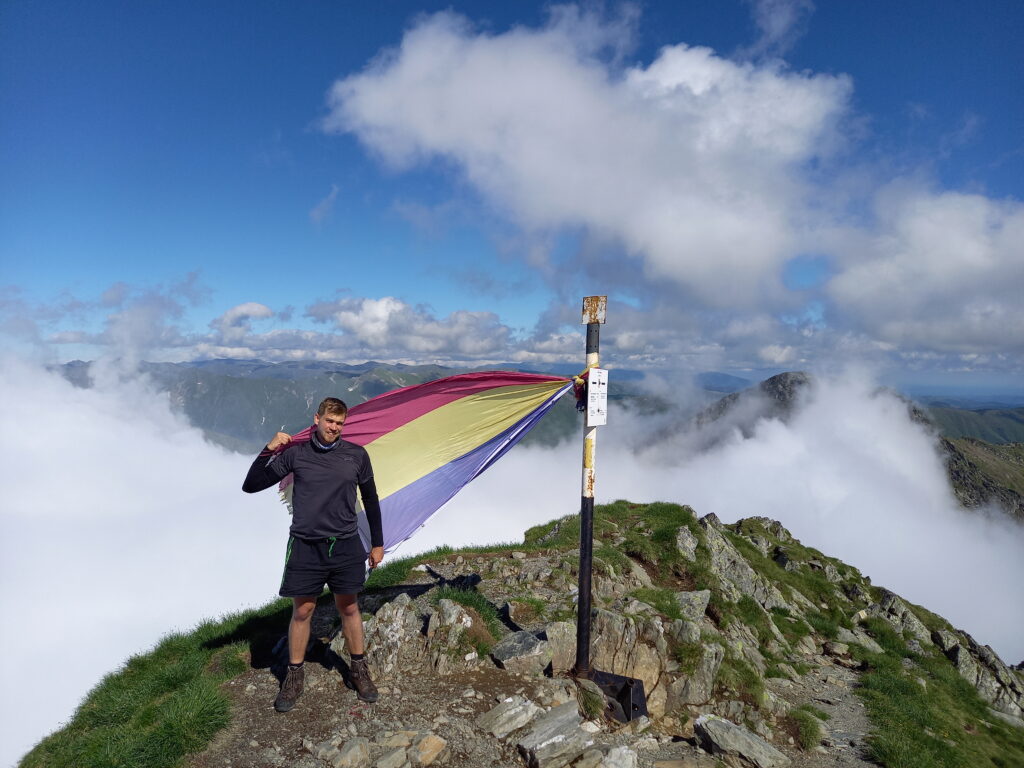
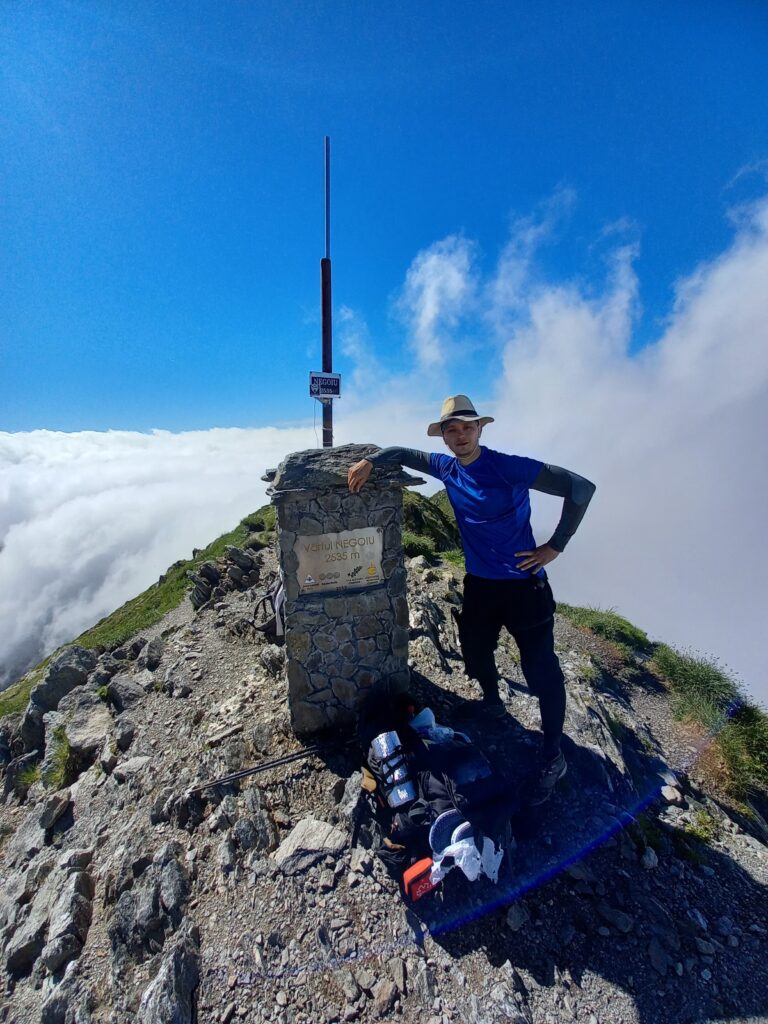
Po Negoiu už nás čekal jen sestup k jezeru Caltun. S vírou, že nic horšího, než co jsme absolvovali, už nás nemůže potkat, jsme se jali klesat, a i přes občasné komplikace způsobené širokými a kluzkými sněhovými jazyky jsme brzy dorazili do cíle. Tam nás čekal prostorný nouzový přístřešek a s ním i sucho a závětří. A také konečně společnost, jelikož jsme narazili na skupinku tří rumunských horalů. Ti si po vyslechnutí odkud že to jdeme klepali na čelo, co jsme to za blázny. Společně jsme popili, pojedli, zanechali doufejme dobrý dojem z naší domoviny a dozvěděli se, že slanina se rumunsky řekne slanina. Pokusili jsme se také, někdo s větším, někdo s menším úspěchem vykoupat v ledové vodě, vyprat si prádlo a vůbec provést v pohodlí přístřešku inventuru a údržbu eráru. Po předchozí noci a zážitcích onoho dne se nám na dřevěných pryčnách spalo jak v nejlepším hotelu.
After Negoiu, only the descent to Lake Caltun awaited us. Believing that we can´t expect nothing worse than what we went through, we set out to descend, and despite the occasional complications caused by the wide and slippery snow slopes, we soon reached our destination. There was a spacious emergency shelter waiting for us, dry, warm and hidden before the wind. And also, finally, the company, as we came across a group of three Romanian hikers. After hearing where we were going from, they just shook their heads, what kind of fools we are. We drank together, ate, hopefully left a good impression of our homeland and learned that bacon is called the same in Romanian and Czech. We also tried to bathe in the icy water of the lake, someone with greater, someone with less success. Wash our clothes preform the inventory and maintenance of our equipment in the comfort of the shelter. After the previous night and the experiences of that day, sleeping on wooden planks felt like at the best hotel.
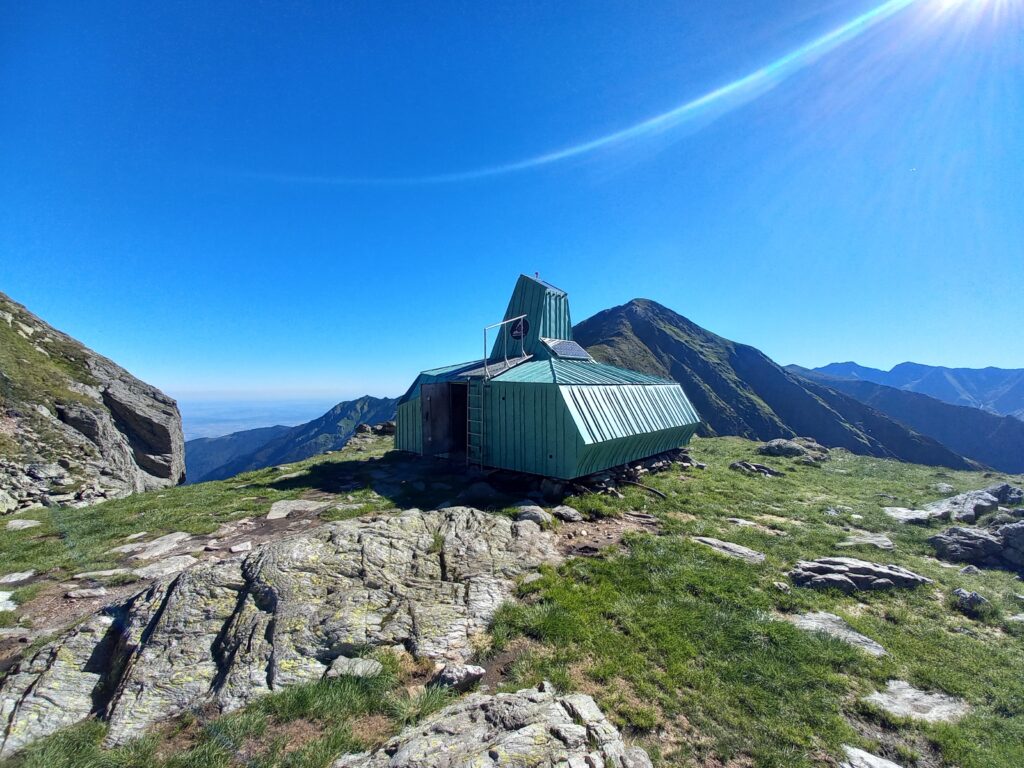
Tento blok obsahuje neočekávaný nebo neplatný obsah.
Pokusit se o obnovení bloku
After a luxurious night, we woke up again to a beautiful, clear day and could enjoy the view of the entire glacial lake and the valley below. A bonus was the sighting of several mountain goats, grazing on the vertical cliffs and apparently feeding on stones. Another climb through wild terrain awaited us, but significantly easier than the previous day. We also started meeting other tourists, especially one-day-hikers from the nearby resort at Lake Balea, where we were also headed. In addition to the ubiquitous Germans, we also encountered several compatriots from our hometown. We exchanged experiences with them, shared some advice and found out that a bear alert had been issued near Arefu. Fortunately, a full 20 km from us. Knowing that these beasts tend to avoid areas with more human traffic, we set off in an ever-growing group to the center by the lake without any fear. Unfortunately, my ankle injury, which paradoxically, I picked up as part of the preparation for our expedition, started to resurface. The sprain didn’t have enough time to fully heal in a mere two months, and the rough terrain took its toll on it.
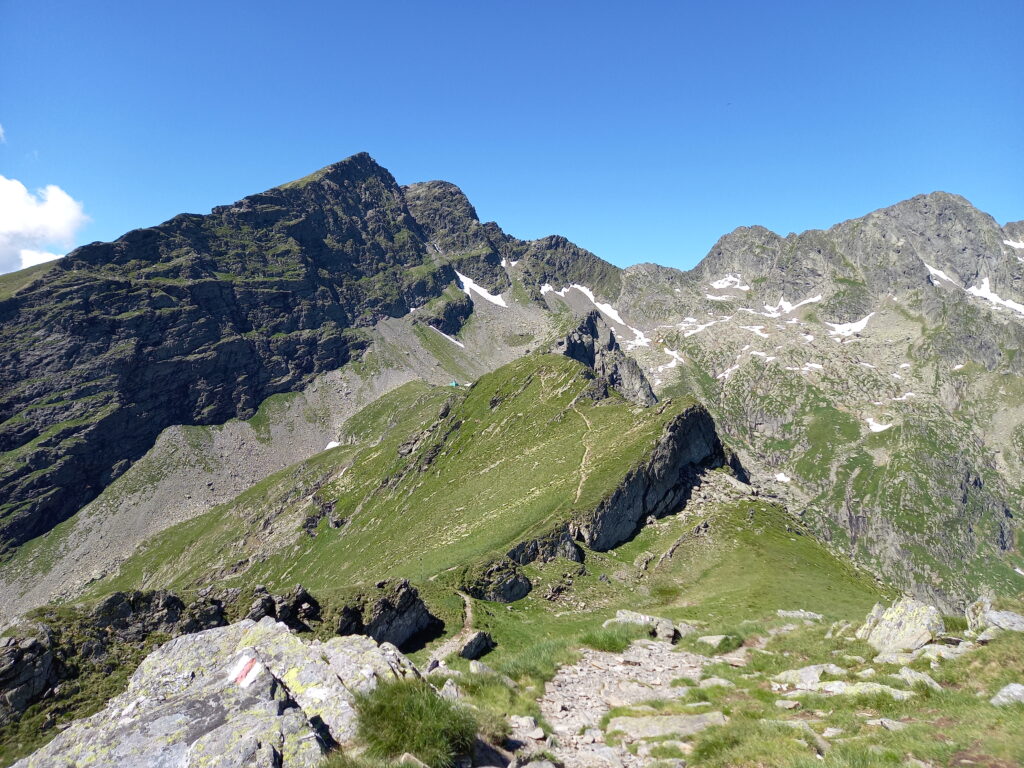
So we decided to treat ourselves to some luxury as part of our recovery and stay right at the lakeside resort. During the descent, as a curiosity, we met a trio of quite carelessly equipped men who asked us if they were going correctly to Negoiu. Since it was already after 2 o’clock, we gently informed them that it would take 5-6 hours to get there alone and it was no walk in the park. They did not believe and moved on. We made a note that we should watch the news in the evening to see if we heard about them again.
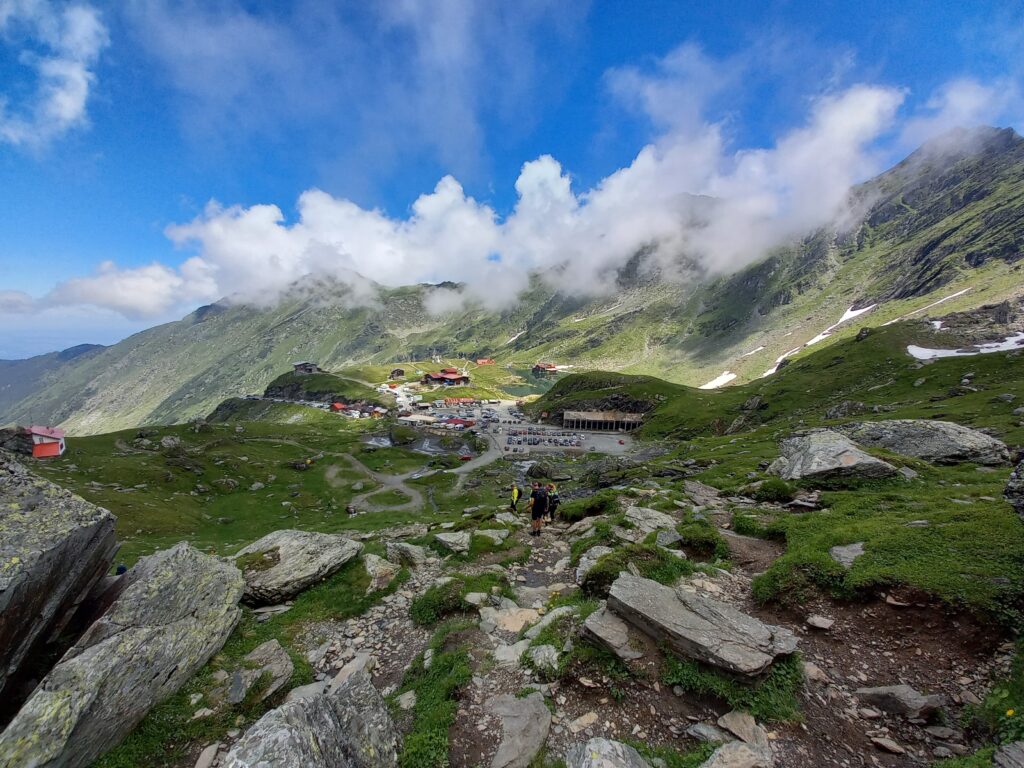
Accommodation in a pension cost us 180 Lei. For Romanians, who consider Lake Balea to be something like Aspen, Colorado, it was an outrageous amount. However, we saved a lot of our accommodation funds in the past few days and didn’t think about it for so long. The sight of a huge tent with food, which we came across right after the descent, helped us in this. Grills filled to the brim with steaks, sausages and potatoes. Pastries, grilled vegetables and mustard. After five days of careful rationing, we found ourselves in paradise. All-you-can-eat for 50 Lei and Czech beer as a bonus. When we rolled out of the tent, it was clear to us that we weren’t going to get anywhere today anyway.
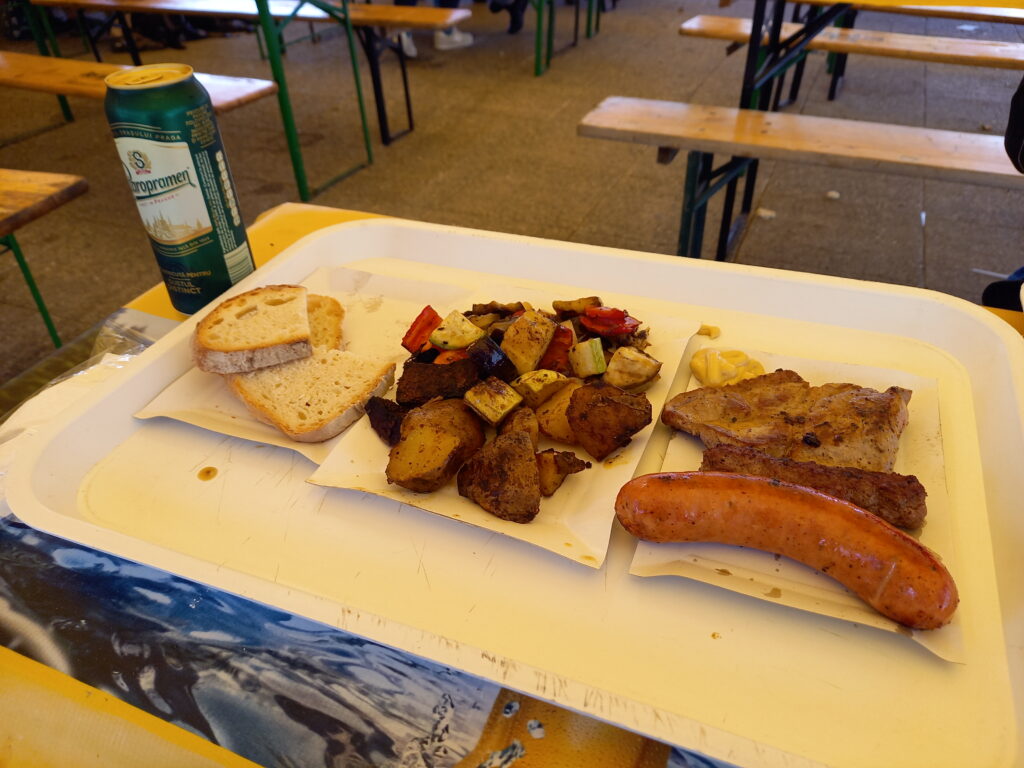
So we settled in and went on a tour of the center. It is much visited as it is reached by one of the most scenic roads in the world, which then continues through the Carpathian ridge, and is the only place within 80 km where the mountains can be driven through by car. In addition, you can take a cable car to the lake located here and enjoy the views without the effort of walking. We continued our gluttony and in addition to coffee and coke we bought a quarter-kilo pastry sweets called Trdelnik, which could also be used as a forearm cover.
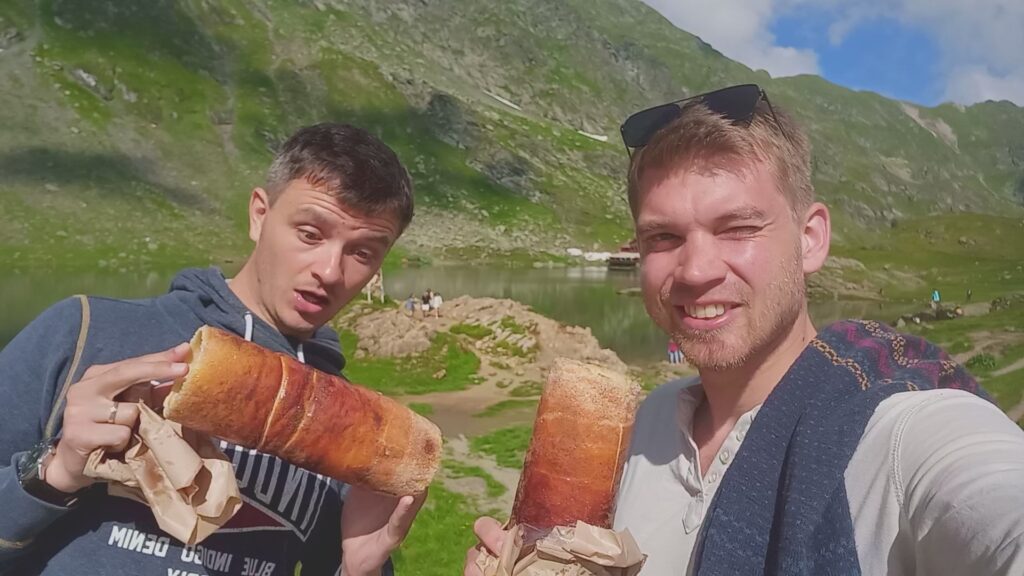
We decided to leave visiting the various souvenir stalls for the morning and instead sat with a beer on the shore of the lake and enjoyed the sight of the Romanian playboys who took advantage of the sunny weather and took their high-maintenance girlfriends out into nature with their high-maintenance BMWs. We had polenta with sheep’s cheese for dinner and after a long time we were getting ready for a real shower, a real toilet and a real bed. I fell asleep hoping that all the fat and sugar I’d crammed into me would help my ankle ligaments to regenerate.
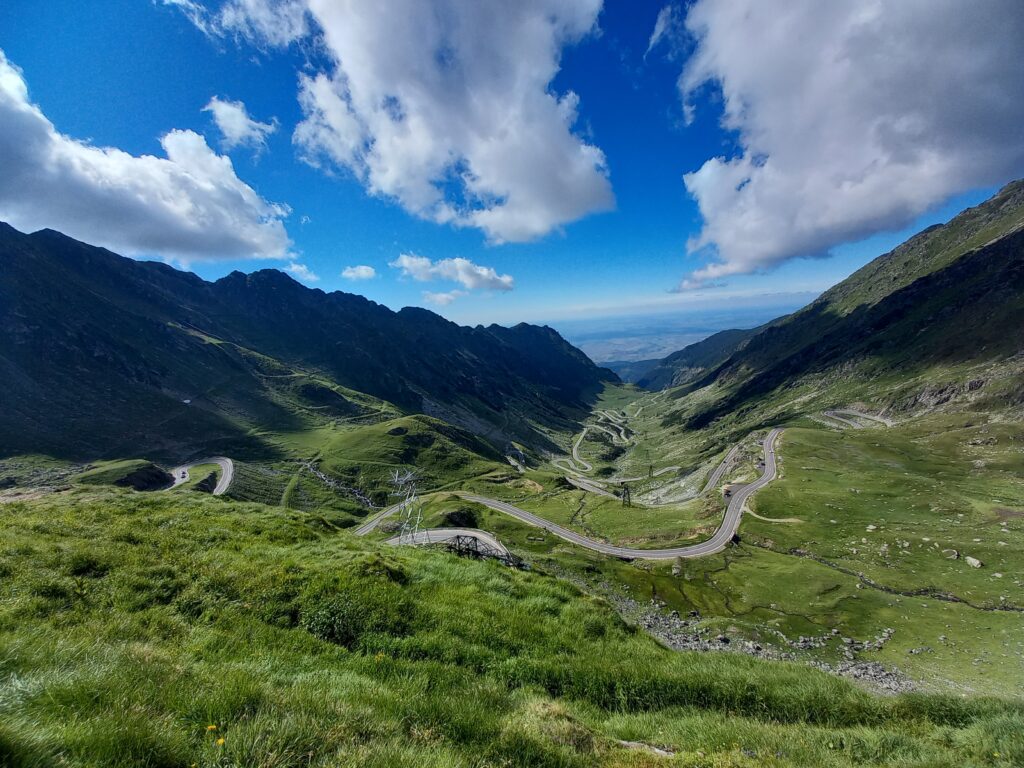
Tento blok obsahuje neočekávaný nebo neplatný obsah.
Pokusit se o obnovení bloku
After a blissful sleep in a comfortable bed and unprecedented luxury in the form of a shower and a real ceramic toilet, we enjoyed the breakfast. While it wasn’t anything extraordinary, one appreciates the fact that it is served right under one’s nose without having to use a gas stove and filter water. We ate on the hotel terrace with a view of our upcoming climb. Before leaving, we still had time to stop at the market to buy a few trinkets, and mainly provisions for the trip, and at nine o’clock we went to climb the wall above the lake. Fortunately, we managed to do it while the trail was covered in shadow, because it was a really killer hike.
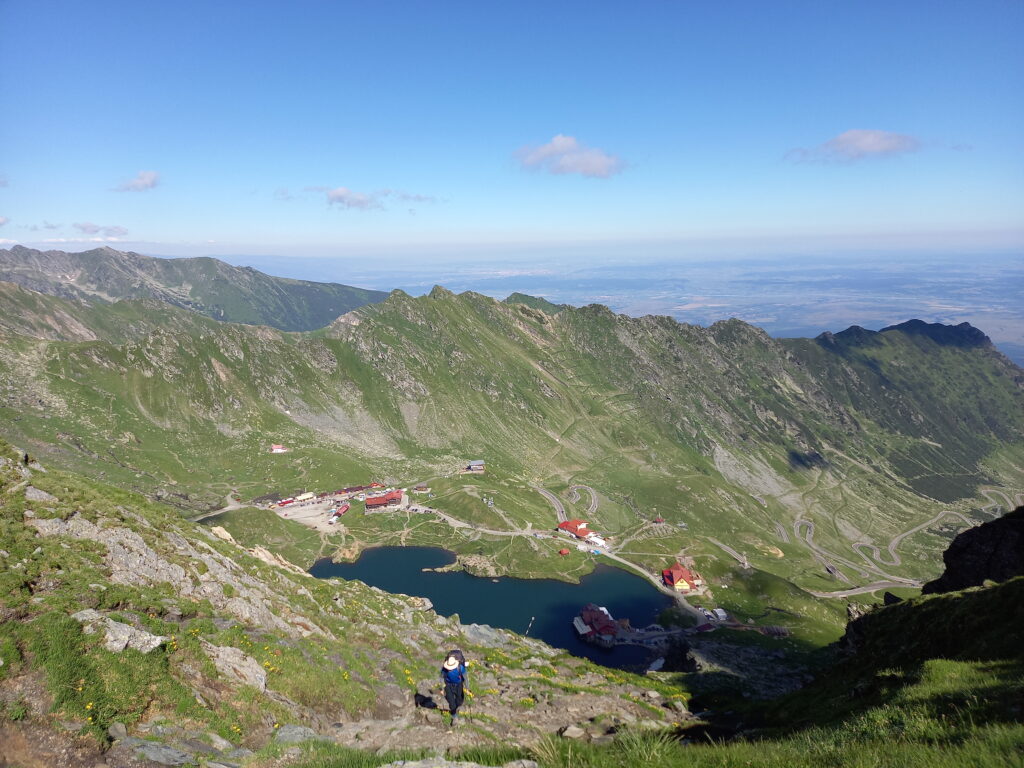
At the top, we allowed ourselves a short stop and, together with the crowd of tourists, enjoyed the view of the valley from the other side than the previous day, and especially with the warm feeling that the most demanding climb of the day was already behind us. We continued further east looking for the red markers of our route as one beautiful valley after another opened up below us. The journey was difficult in places, but the experiences of the previous days prepared us well for it. Even so, we tried to tread carefully, which was encouraged by a number of memorials lining the ridge, of which we noticed several with the names of our compatriots.
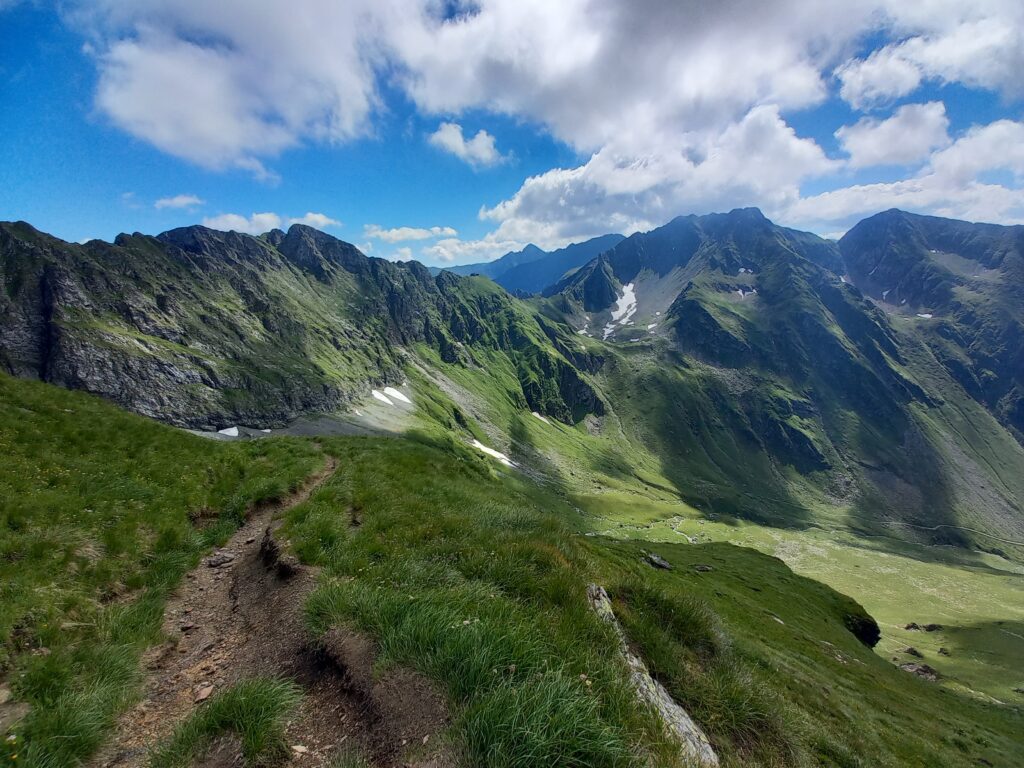
After climbing Apasul Máre, another lake appeared in front of us, but this time it was considerably less picturesque. The debris of the local emergency shelter complemented the piles of trash around the water, even in the lake itself. In short, the proximity of civilization was still very noticeable here. We only had two kilometers to go to our planned overnight stop. We needed to get as much water as possible, because according to the map, we might not be able to do it anywhere the next day. However, we were concerned that the water from the toxic lake would be too much for our filters and continued on, hoping to come across one of the higher streams. Fortunately, we managed to do that along the way. So we filled in as much as we could, even at the cost of a significantly increased load on our backpacks. But the goal was almost in sight.
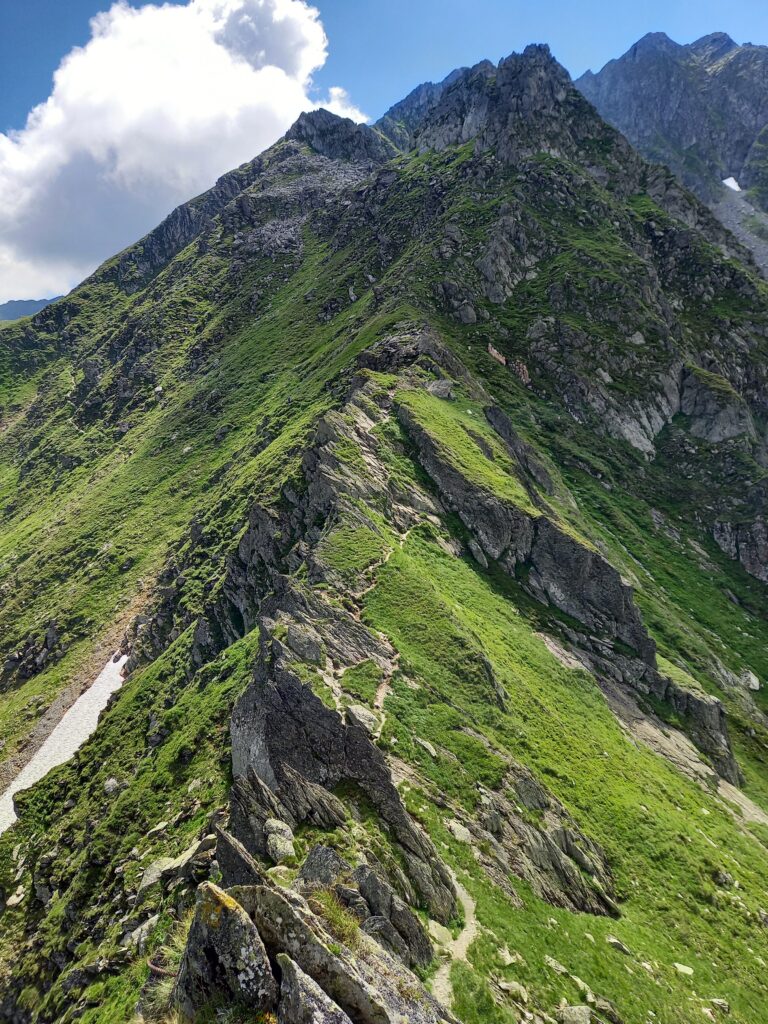
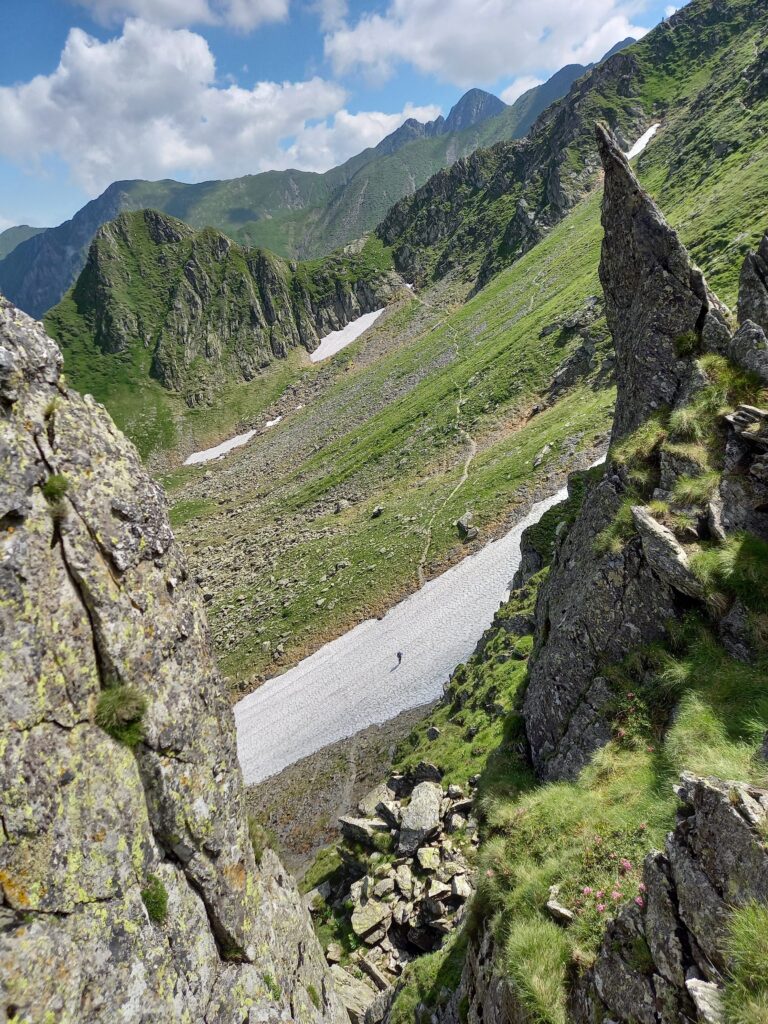
We ran into another group of Czechs, this time from Cheb, and shared our experiences. We could tell from a distance that they were compatriots. This time, not by socks in sandals, but by loud shouting about “stupid drunks at Vltava river”. At half past five in the evening we finally arrived at our campsite on the platform below Corabia Peak. While Igor went up the hill to thoroughly explore it, I spared my still sensitive ankle and in the meantime built a luxurious kitchen right next to the tent from the stones scattered around. As part of the preparation for tomorrow, when we had to climb the highest mountain in Romania, Moldoveanu, we ate heartily and slept early to gather strength. Spending the night only two hours below the summit, we hoped to reach it first.
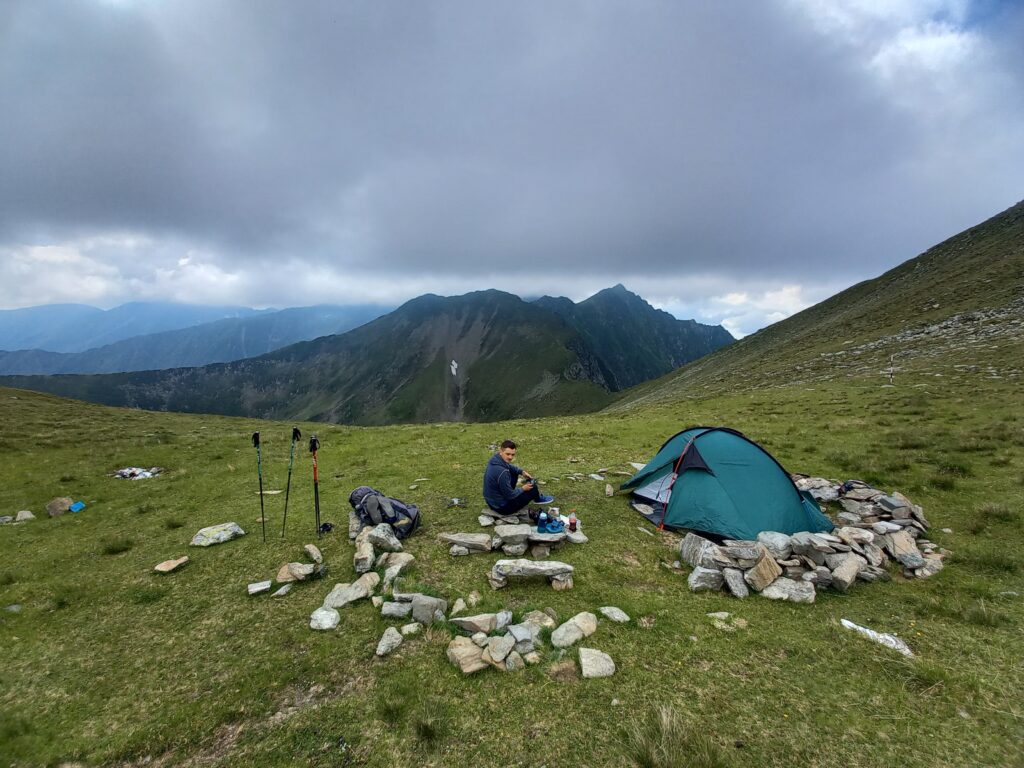
Tento blok obsahuje neočekávaný nebo neplatný obsah.
Pokusit se o obnovení bloku
Our ambition to be the first on Moldovean was dispersed quite quickly. While we were packing up our camp in the morning, a couple who had set out early in the morning from a nearby mountain lodge passed us. Their modest rucksacks gave them a considerable advantage against us, so pursuit was out of the question. So we threw our massive luggage on our backs and slowly but surely made our way to the mountain in a march similar to the shifting of the continental plates.
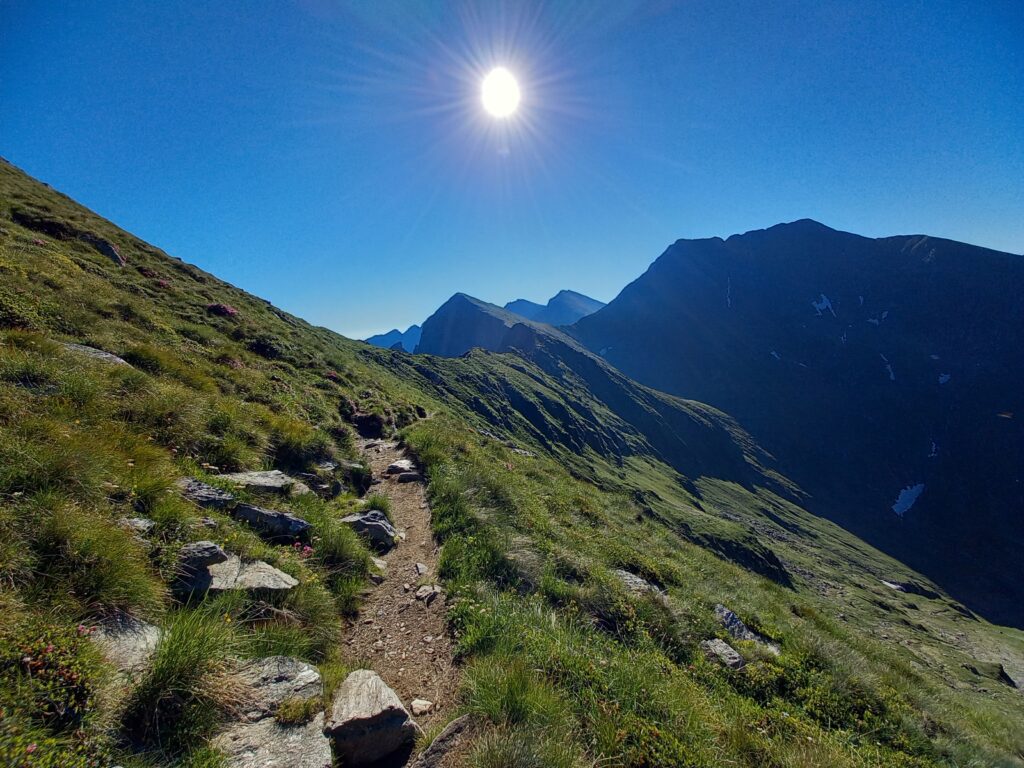
Moldoveanu loomed menacingly high above our heads the whole time, constantly reminding us how high we had to climb. The extra kilograms in the form of water reserves were compensated by almost the same amount of sweat, and after a few hours we actually found ourselves on Vistea Mare, which is the third highest mountain in the country and at the same time a peak that is by a narrow rock ridge connected to the roof of Romania. Since we were planning to return to this location and then continue further east, we opted for a practical solution. We left our backpacks here and continued on Moldoveanu only lightly, with the drone and valuables that would be more of a complication, if stolen. If someone managed to take our backpacks away, they would in a way deserve it.
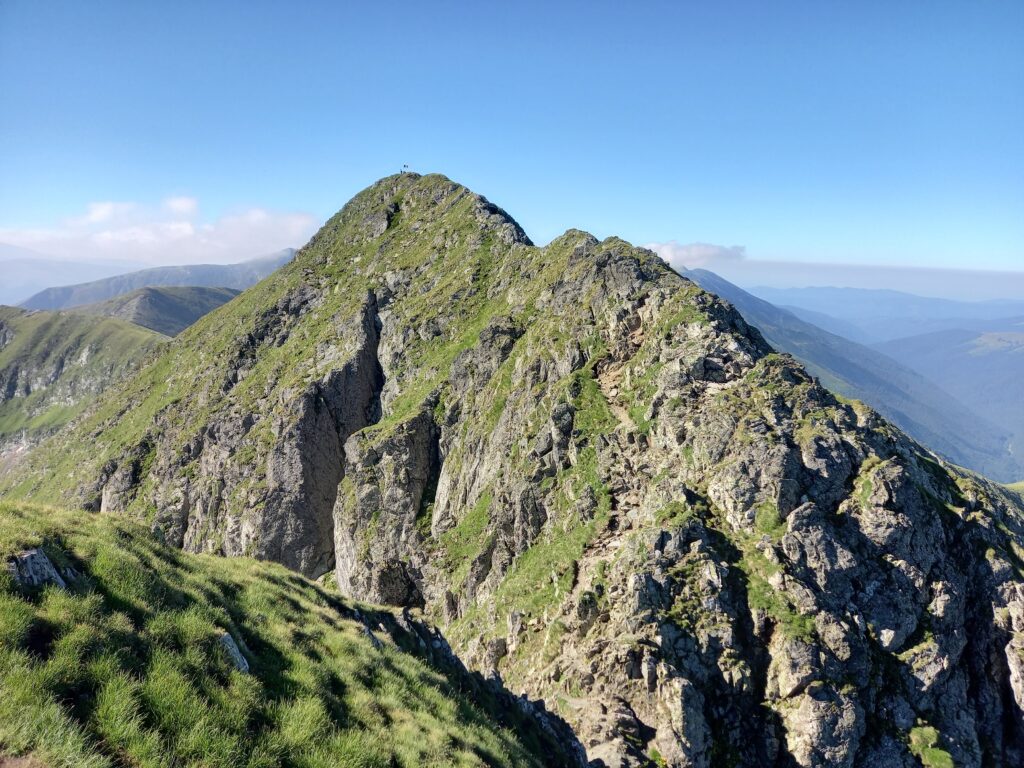
Our approach turned out to be the right one, as a narrow ridge, full of climbs and descents with the help of chains would not be impossible with a full load, but hellishly problematic. In this way, we were able to jump to the end of the road, relieved and feeling like mountain goats, and solemnly stand under the Romanian flag, which decorates this important point. The crowd at the top also showed us that our plan to be there first had no real anchor. The mountain was also accessible from the south side, following a much less demanding route, which was used by many other enthusiasts on this beautiful day. However, we didn’t mind one bit. We knew we couldn’t climb any higher in Romania, there wasn’t even a cloud in the sky, so we put our feet up for a few moments, enjoyed the wonderful view and ceremoniously drank the remaining rum.
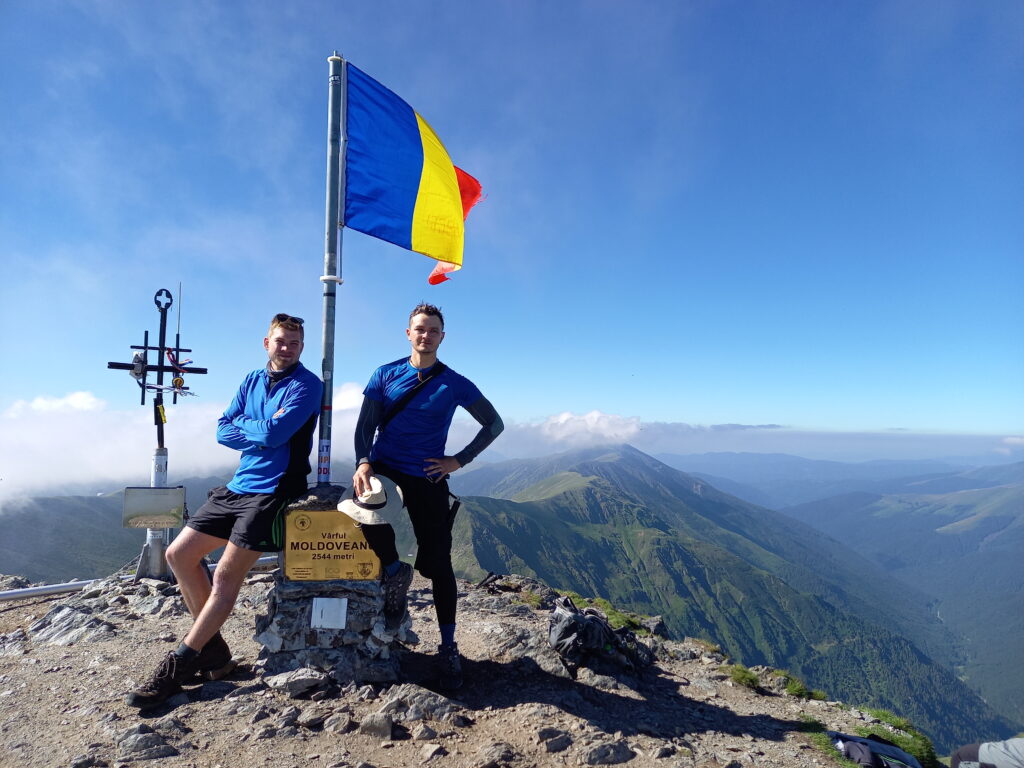
After a short celebration, we decided that it was not worth delaying any longer. We still had fifteen kilometers to go to the planned overnight stop and our strength was quickly dwindling. Our decision to take on as much water as possible turned out to be a prudent one, as we left the tourist corridor again on the way east, found ourselves in the middle of the wilderness and did not come across a single possibility to replenish fluids along the way. Although we passed several lakes, they were so deep below us that before we scrambled back to the road, we would certainly drink the collected water.
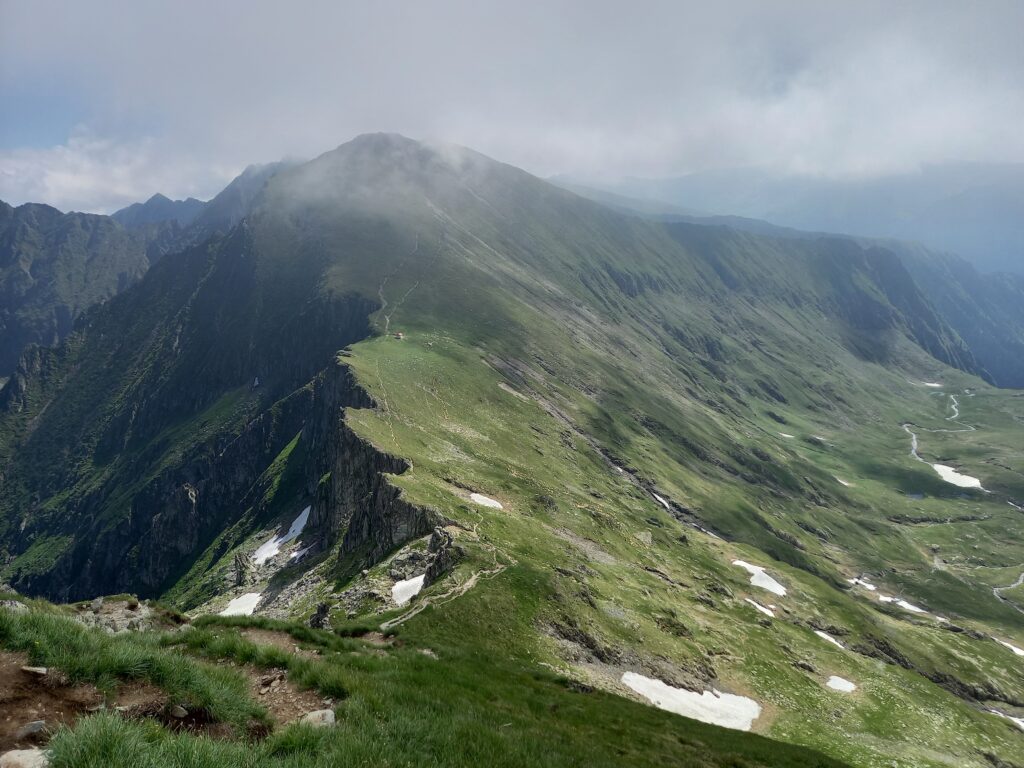
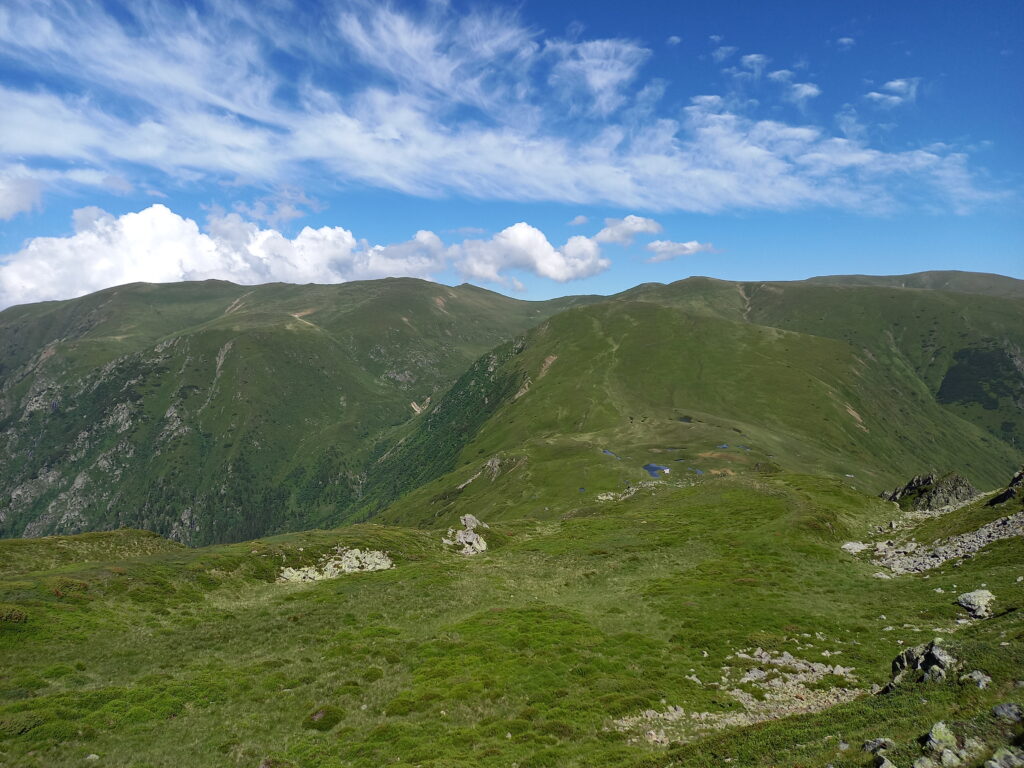
Finally, we successfully reached our destination which was the Zarnei emergency shelter. We could already see it from a distance, as it is cutely set in a mountain valley, and mainly lined with several beautiful lakes. Crushing was our disappointment when, upon arrival, we discovered that the lakes were mostly sheep’s urine, lined with sheep’s droppings. We considered using a filter, but were afraid it would dissolve in the liquid. Fortunately, some kind soul drew a map to a nearby water source on the inside wall of the shelter. The map quoted a distance of 200 m, so we set out to replenish supplies in just our slippers. However, the map forgot to mention the hundred-meter elevation drop. So, with a bit of frustration, we eventually found water that was coming out of our ponds, but had been filtered through several dozens of meters of soil. Best urine we ever drank.
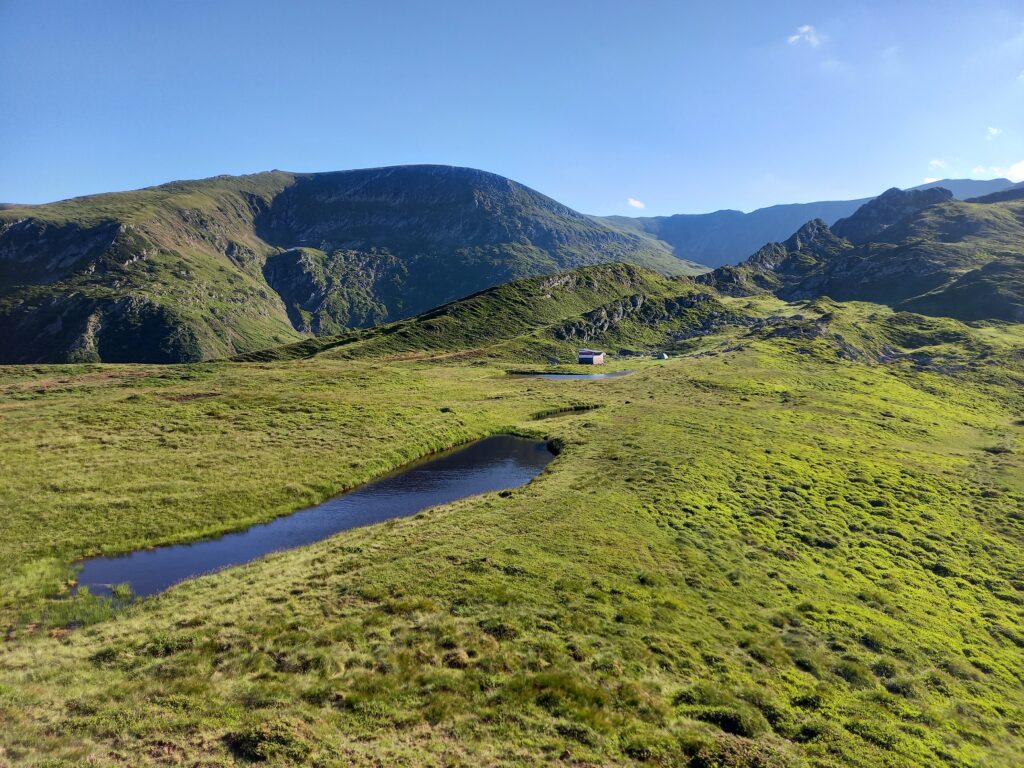
Our evening at the shelter was enriched by several events. First came the shepherd, who had more dogs than teeth, that is, three. Hounds, more used to a beating than petting, suddenly became friends with us and compensated for their lack of cuddles. I, already a week without my wife, felt a similar deficit and after concluding that dog fleas do not attack humans, I satiated my need. However, more fun awaited us later, when a pair of bearded Hungarian hikers arrived from the opposite direction from where we came. First, we focused on their equipment. If our backpacks weighed around twenty kilograms, theirs must have been twice as much. Plus, on that beautiful sunny early evening, they wore thick feather jackets and all kinds of survival gear, including kettle-sized bear spray and knives that could be mistaken for short swords. A pair straight out of a Jack London novel. Of course, we politely offered them to join us in the comfort of the shelter. They said thanks in a mixture of Hungarian, Slovak and German and preferred to set up their tent at a distance. To our relief I must add. Especially after we noticed one of them emerge from the tent in nothing but his briefs and dive into the aforementioned reservoir of sheep excrement in one, unfortunately not very graceful leap. However, it should be noted that this bath rather improved the color of his underwear. Knowing that we had probably seen it all, we locked ourselves in the shed and spent the evening playing cards, hoping we wouldn’t fall victim to some mysterious Hungarian rituals in the night.
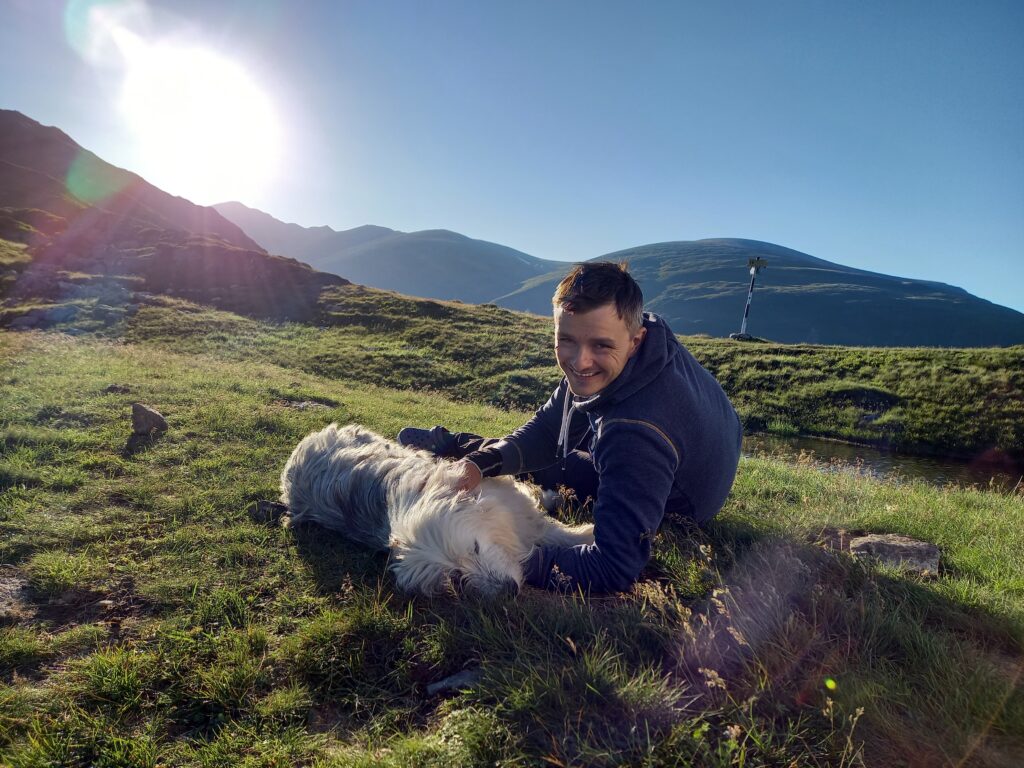
Tento blok obsahuje neočekávaný nebo neplatný obsah.
Pokusit se o obnovení bloku
In the end, the only thing that bothered us at night was a stupid donkey who tried several times to get into our shelter and after failing, he probably decided that if he couldn’t sleep there, no one would. The sounds he began to make woke me up from my dreams for several weeks after I returned. When we set out in the morning, we saw him standing in the distance and I could have sworn he was grinning at us. Ahead of us was a gradual descent from the mountain tops and probably the last night in the wilderness. At least that’s what we thought. As soon as we descended into the woods after about fifteen kilometers of marching along the red trail, we realized that we would rather snuggle up in a tent with the Hungarians than spend the night here. The dark forest immediately engulfed us, the visibility dropped to a few meters, and the piles of dung that we passed along the way told us that we definitely did not want to meet their previous owners. We thought it was a little risky to set up a tent in these conditions, and we were also tempted by the possibility of sleeping in a normal bed and having a draft beer. So we boldly decided to add another fifteen kilometers to the previous fifteen and extend our hike to the town of Zarnesti.
Navigating the dense greenery proved to be a challenge. The signs were only sporadic and unmaintained, and we found our way mostly only thanks to the Mapy.cz application (which, by the way, was also used by all the Romanians, Hungarians and Germans we met). Every fifty or one hundred meters we looked at the mobile phone and tried to correct the course in approximately the right direction. We tried to make as much noise as possible, because in these conditions we could easily step on the bear’s tail before we saw it. The basic rule for encountering a bear is – Do not meet it. If you run into it, then you’ve been doing something wrong. You can be startled, but the last thing you want is for a bear to be startled.
In the end, we managed to find the sought-after gravel road in the forest, which meant the proximity of civilization and the last eight kilometers of the march. After more than twenty kilometers and seven days of hiking, our legs were already running on inertia and the desire for a chilled beer. Cottages began to appear around the road, whose barred windows and strong shutters kept reminding us of the danger of bears in the vicinity. However, the tapping of our sticks perhaps warned them ahead of time, and we solemnly arrived at the destination in a campsite near Zarnesti after more than a hundred kilometers. The timing was perfect as a cloudburst started within minutes, but we were already watching it from the pub as we waited for the taxi to take us into town.
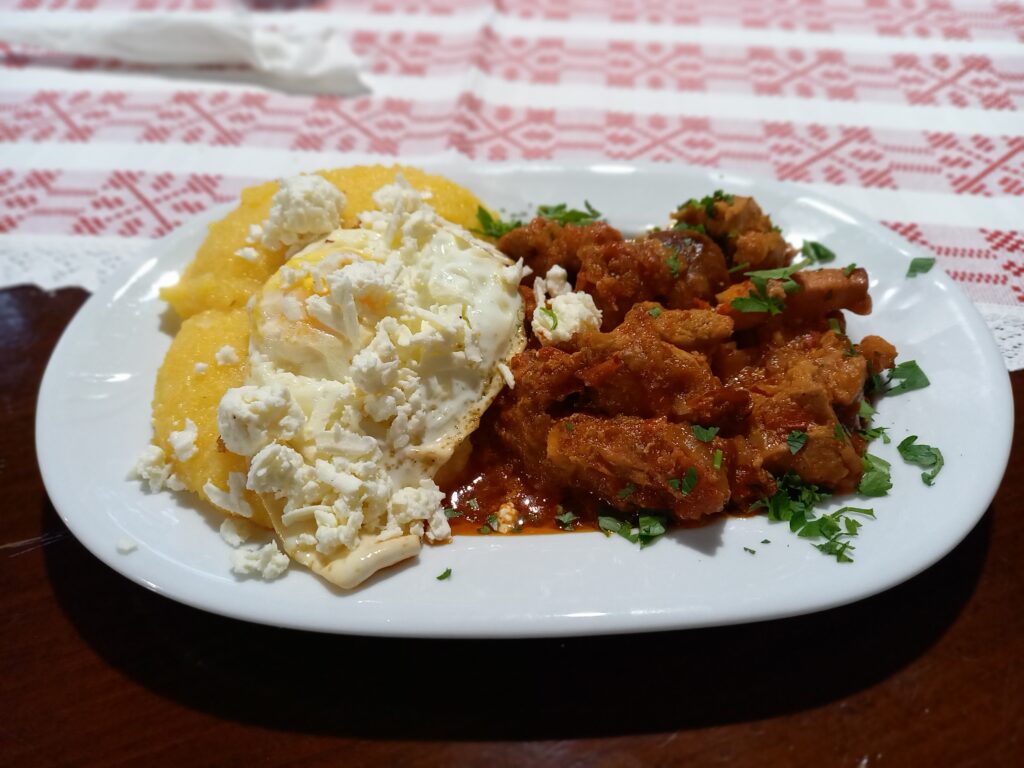
Tento blok obsahuje neočekávaný nebo neplatný obsah.
Pokusit se o obnovení bloku
Only regeneration and celebration of the successful expedition followed. In Zarnesti we treated ourselves to a dinner of gigantic proportions, a shower until the water was running hot, and a sleep in a soft bed that one really appreciates only when one is not getting it. In the morning, the train took us to the tourist-exposed Brasov, where we soaked up the atmosphere of Romanian history, and then we only had the train journey back to Sibiu. Much to my delight, my car was still in the airport parking lot and even had wheels. So we used the rest of the day to explore the city, replenish calories and buy Romanian wines and snacks to compensate our loved ones for the week’s absence. The trouble-free journey home then only crowned the success of our expedition.
Looking back on the whole trip today, I can only speak in superlatives. Fagaras is a beautiful area, for the most part still unspoiled by big tourism, and if you’re looking for inspiration on where to go, I hope these paragraphs and the attached photos and video paint a pretty appealing picture. Many thanks to Igor, who did not lose patience with me despite my health problems, and of course to you readers, who survived my rambling style and questionable English until the last paragraph.
